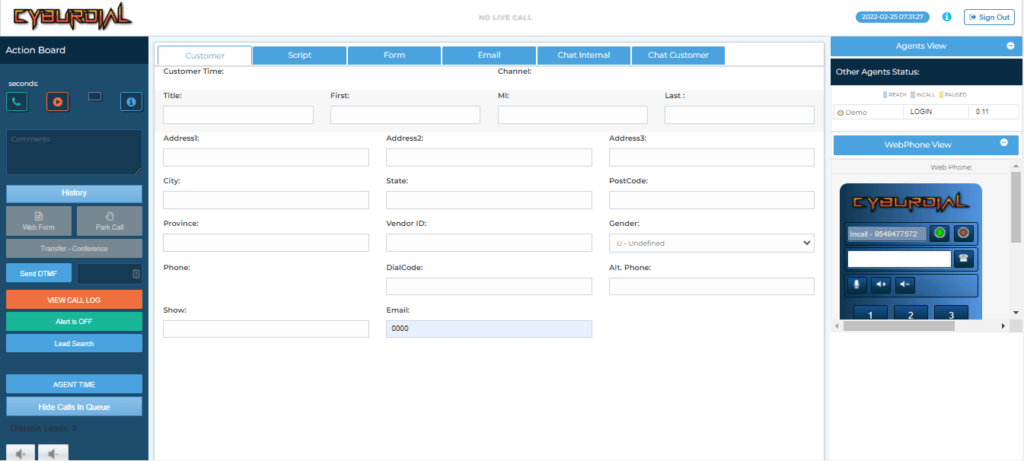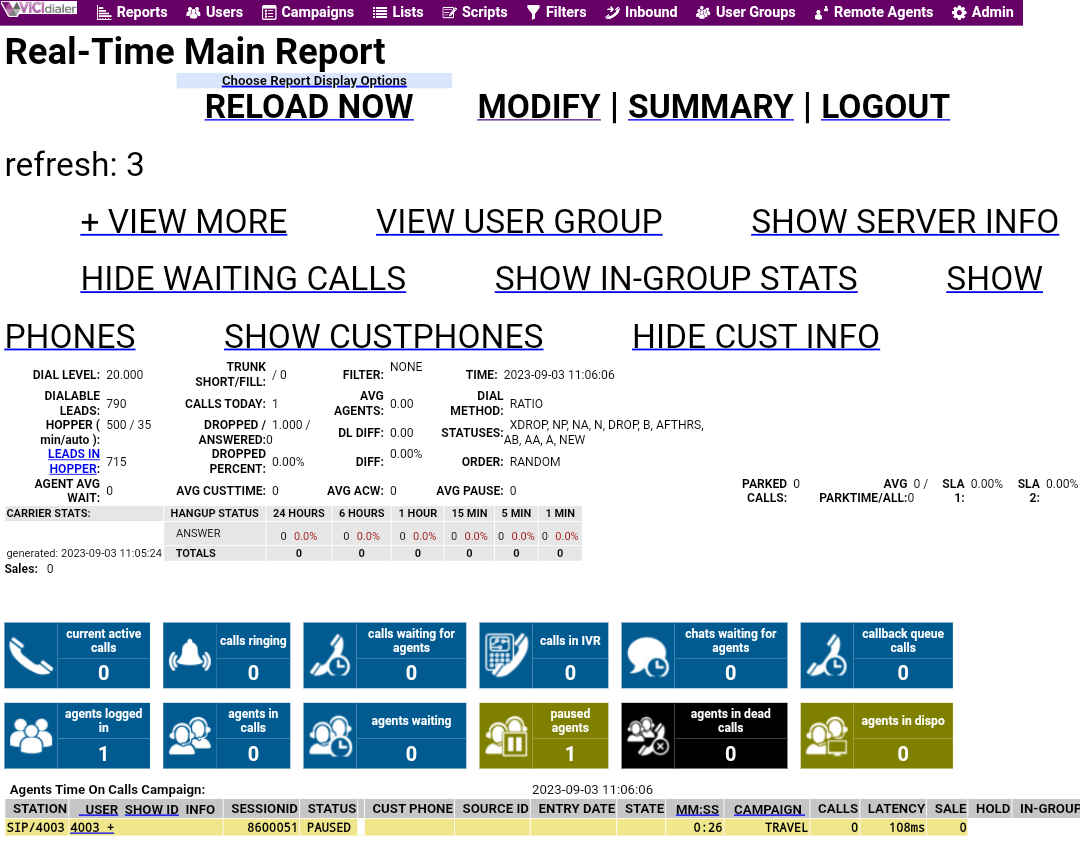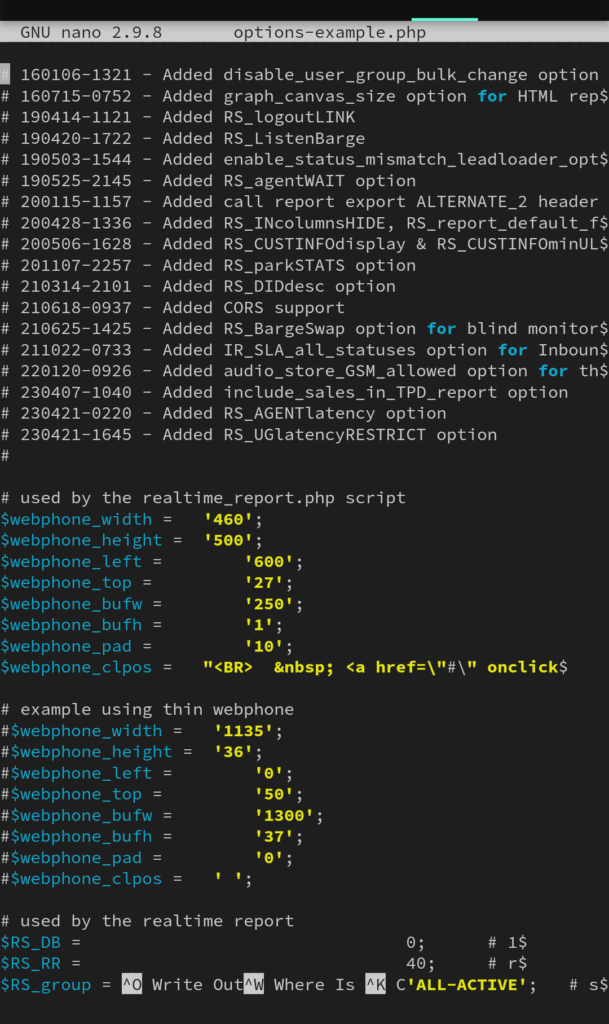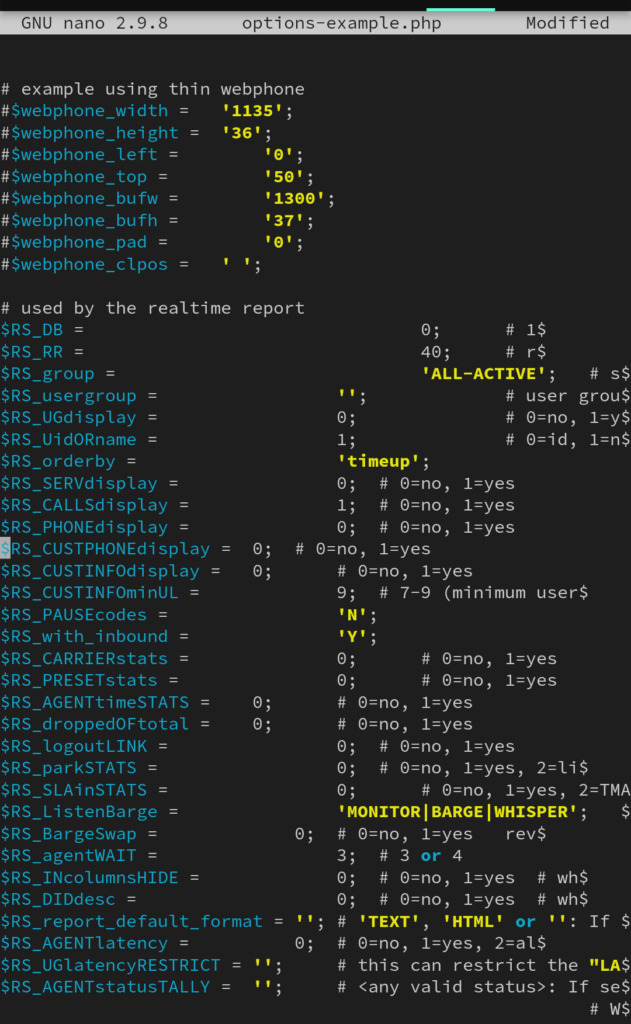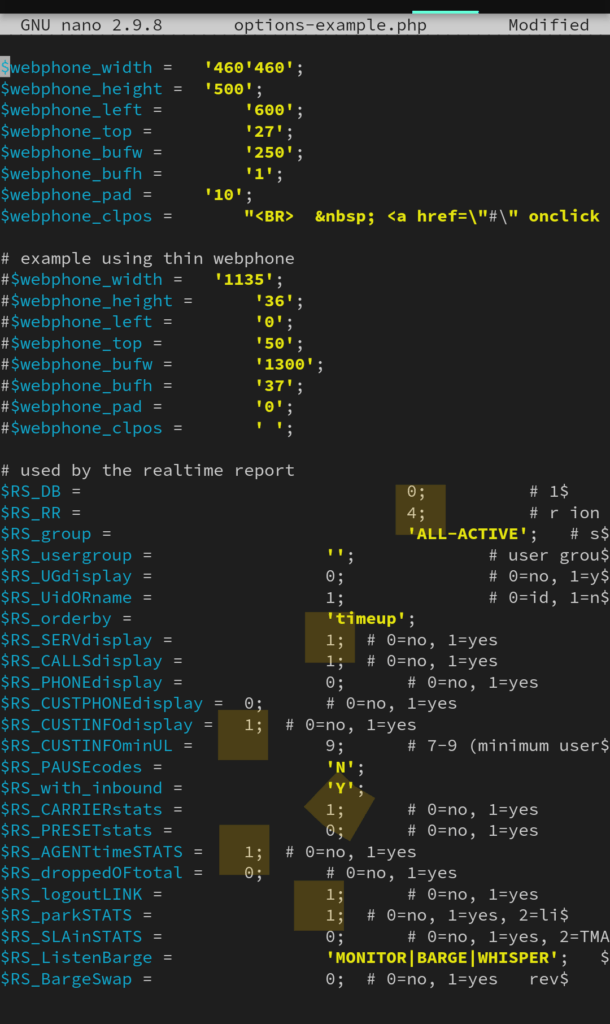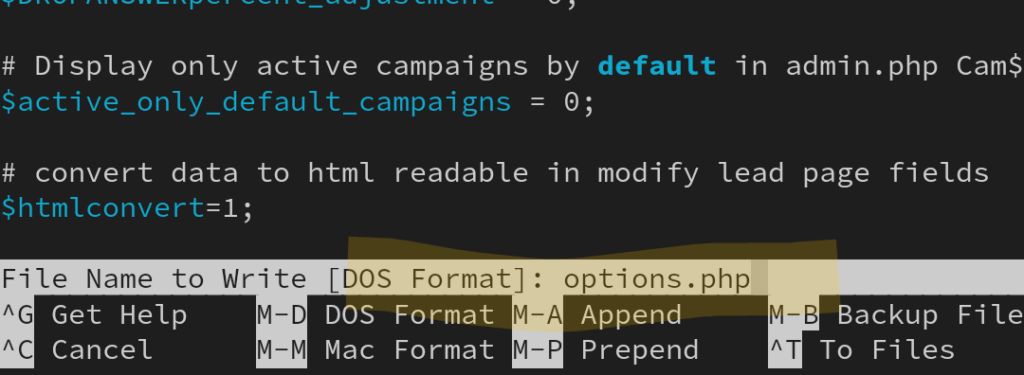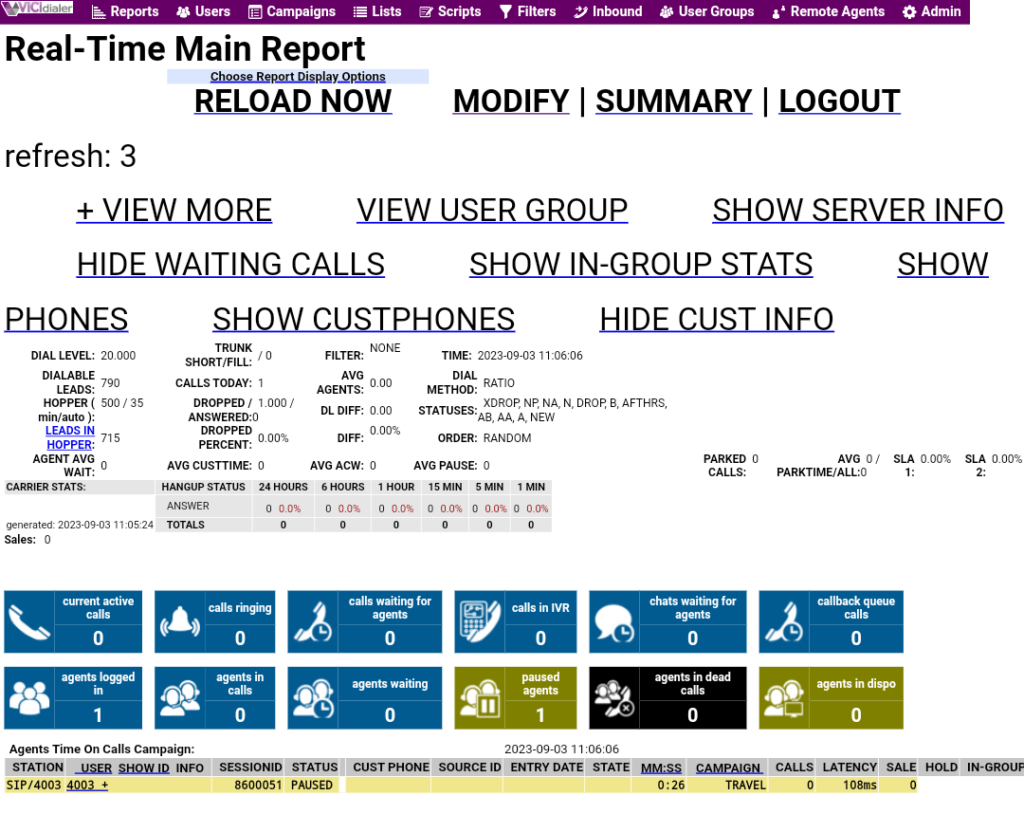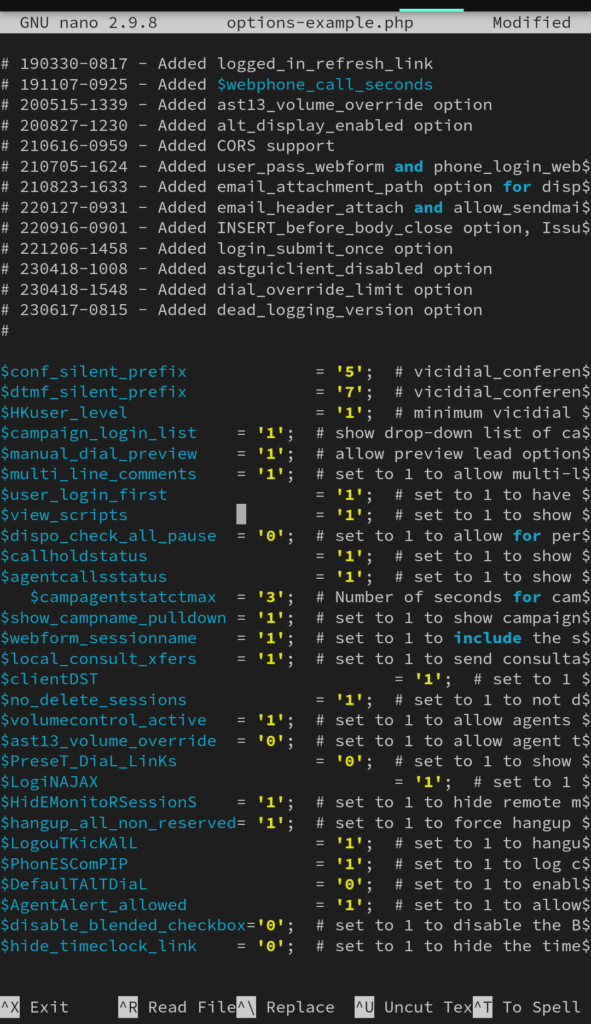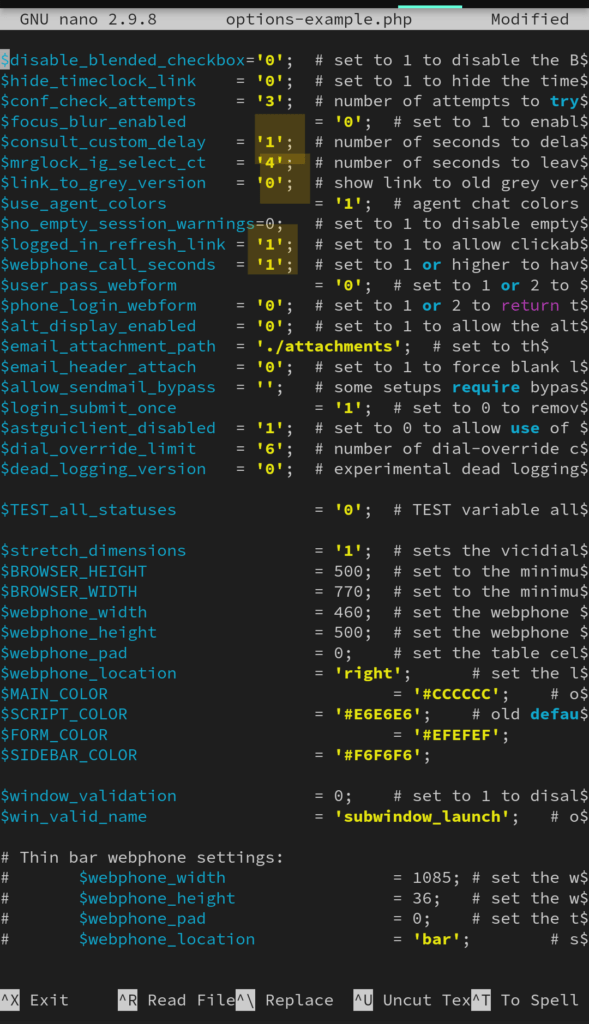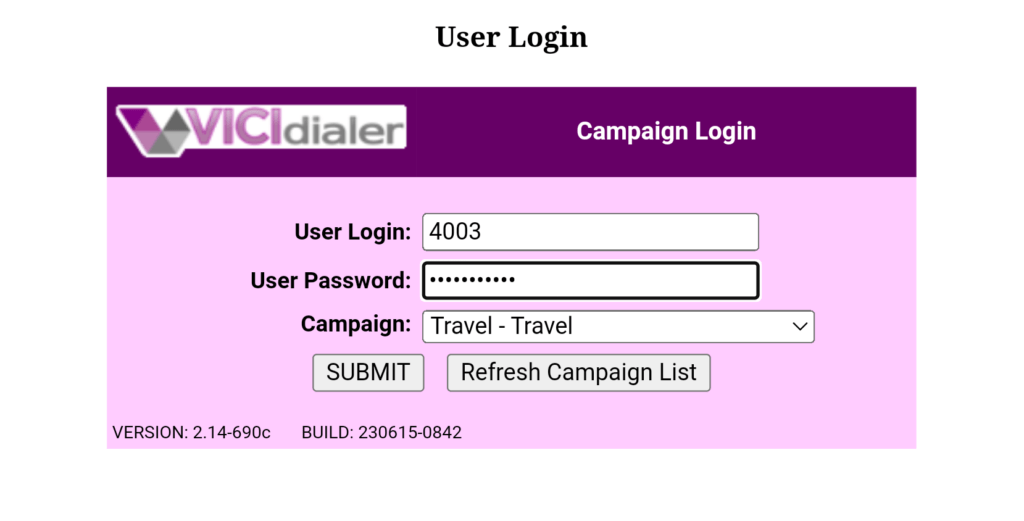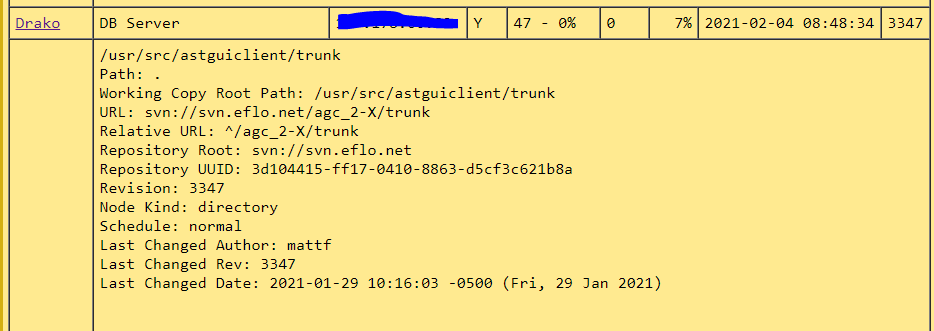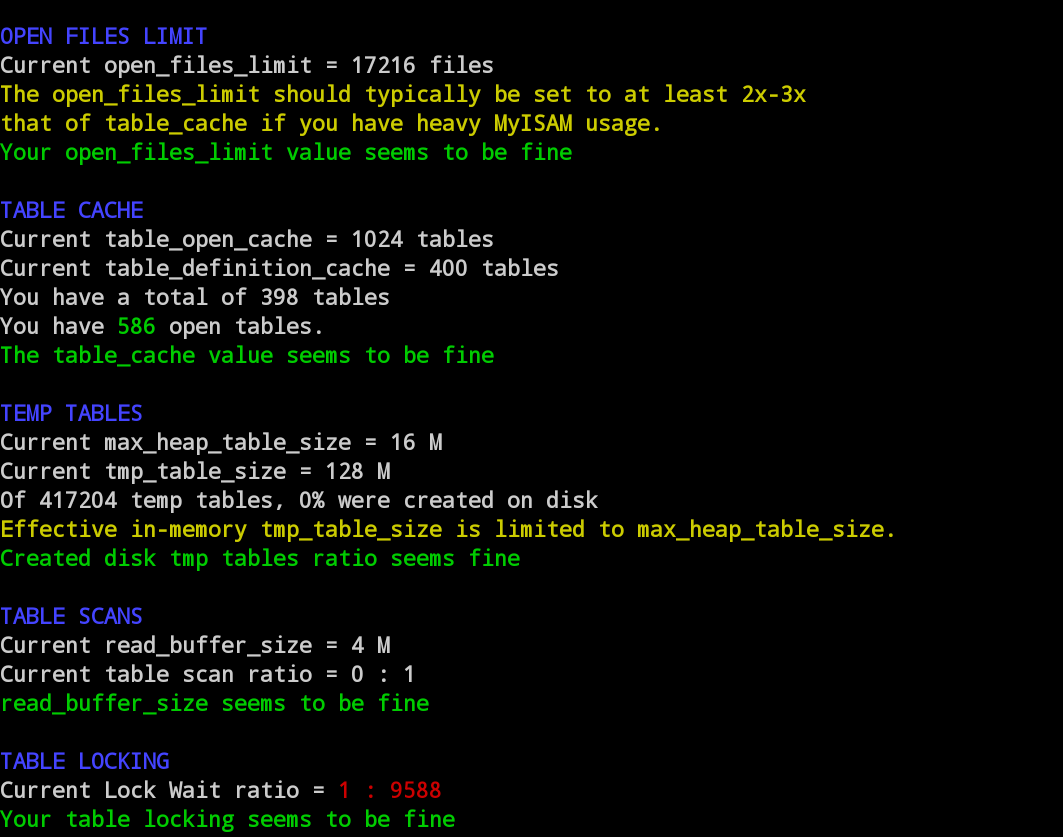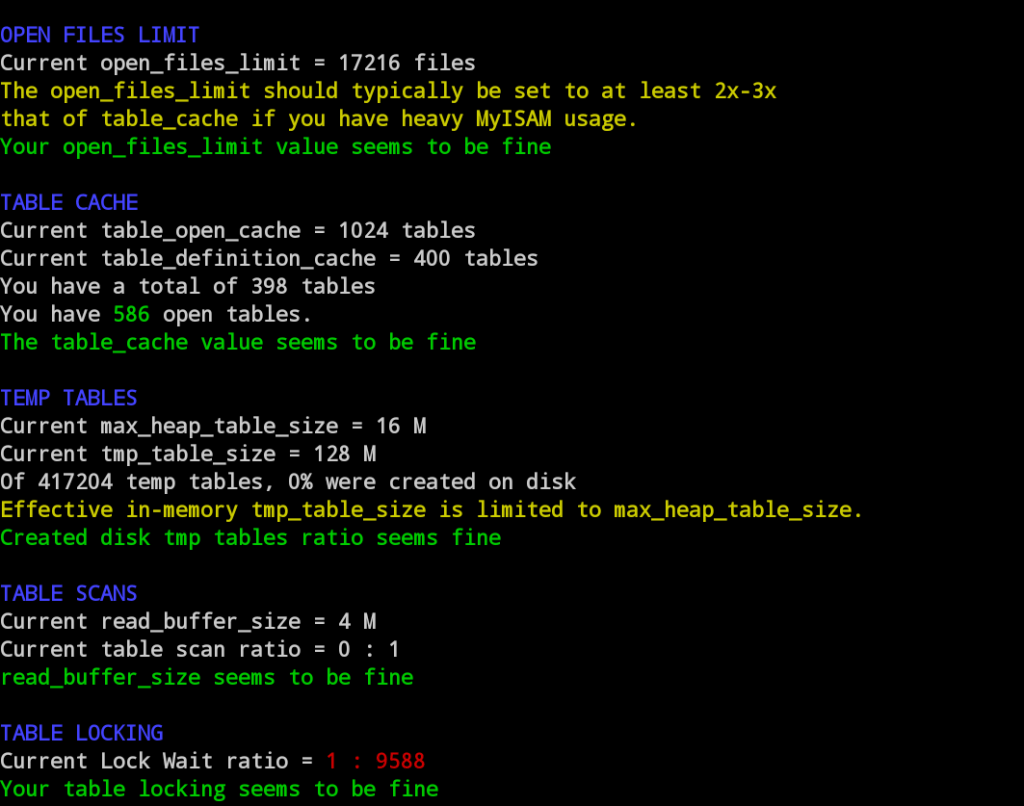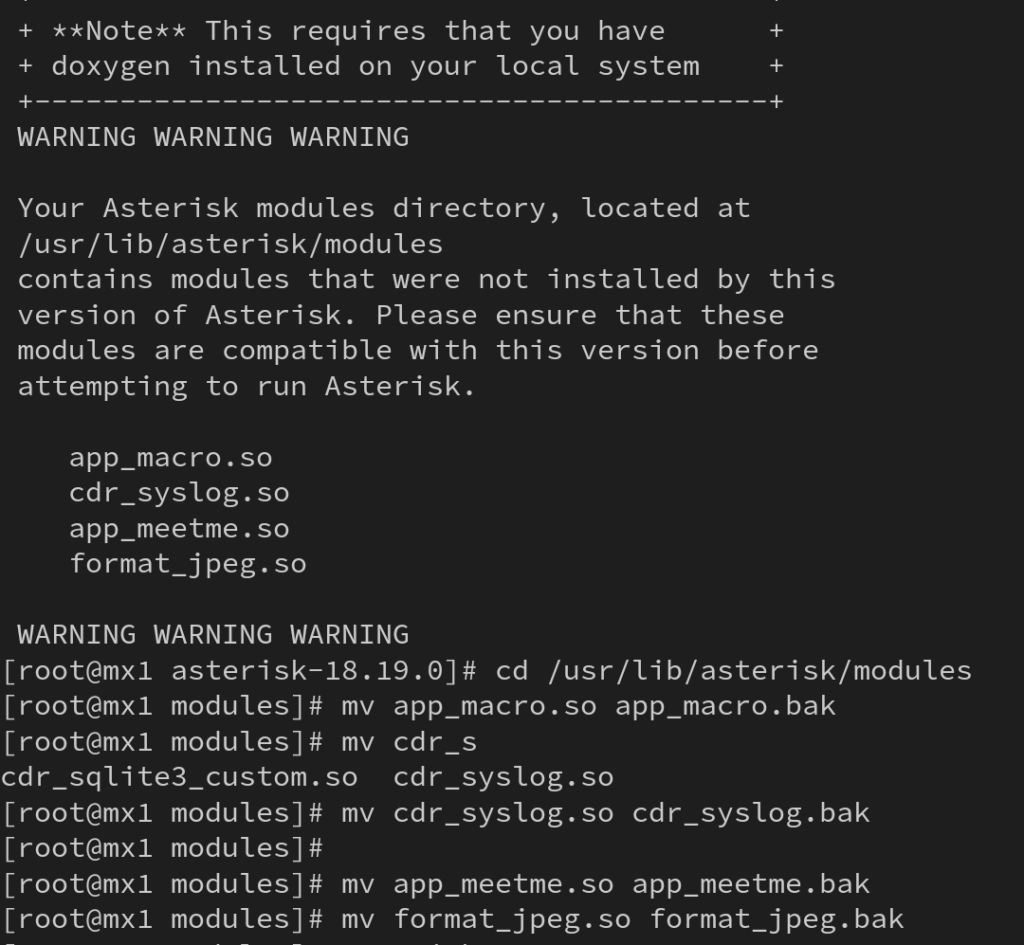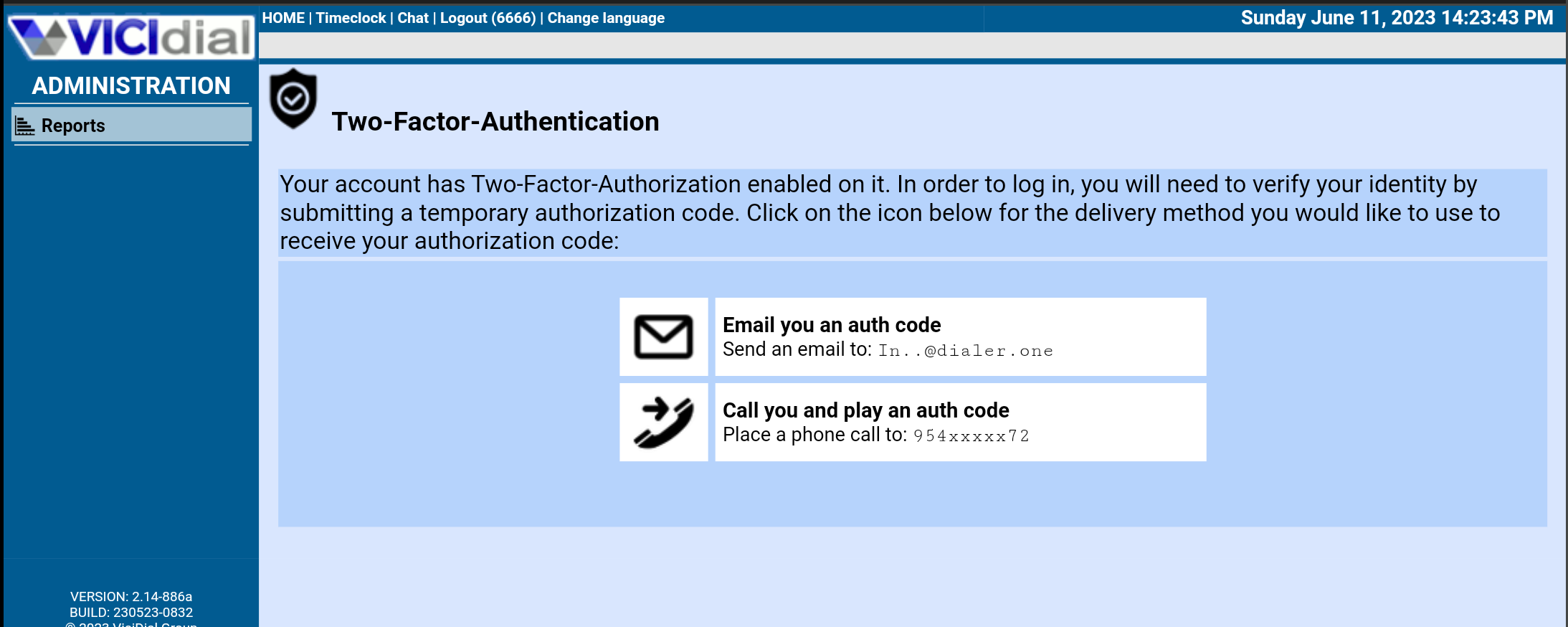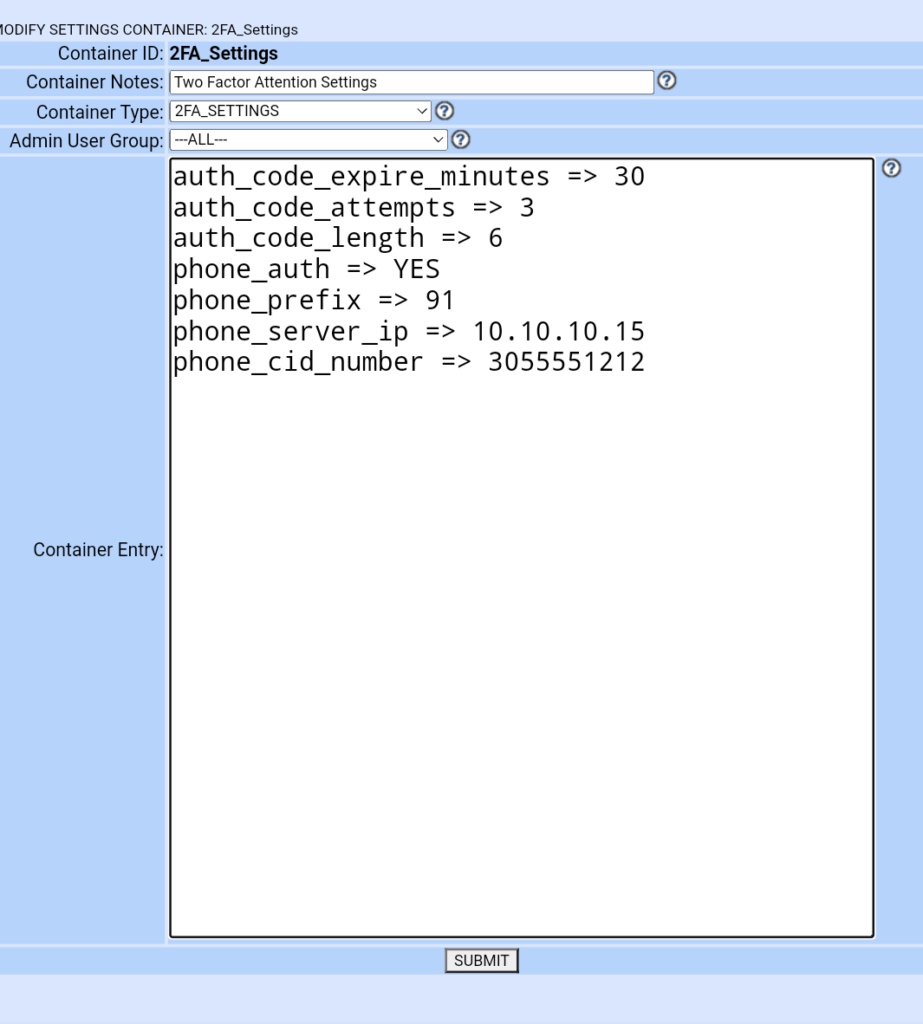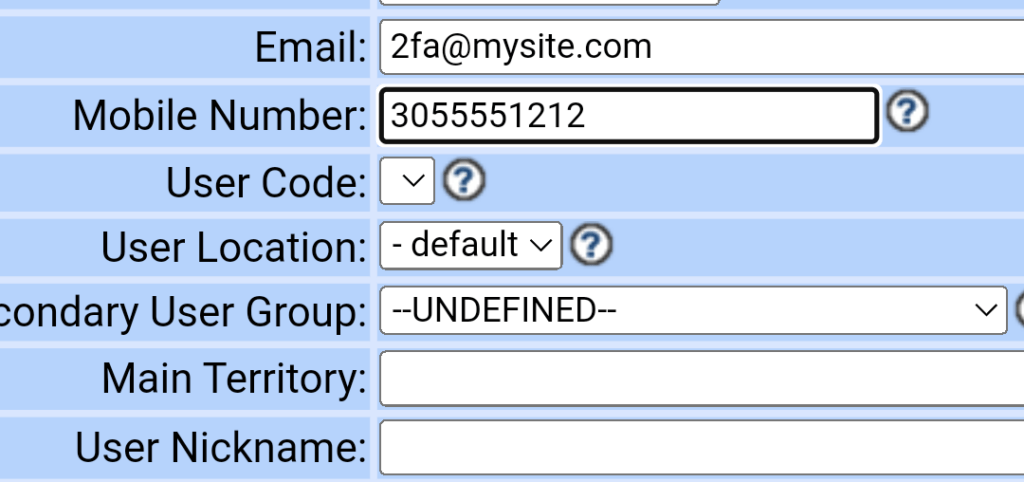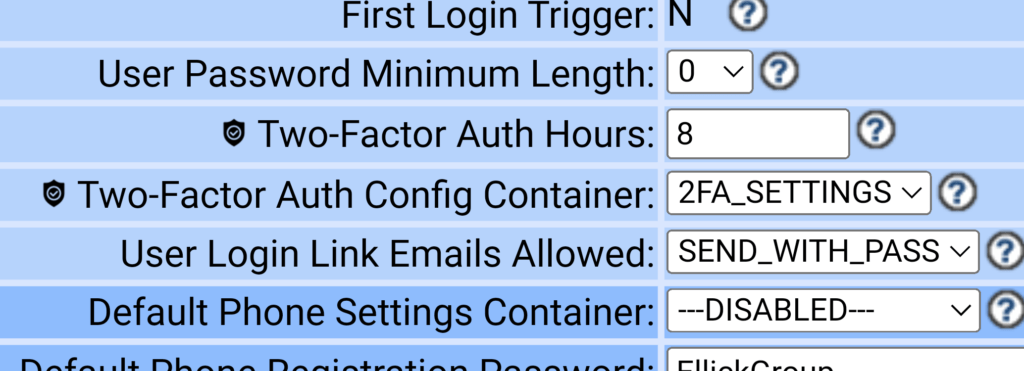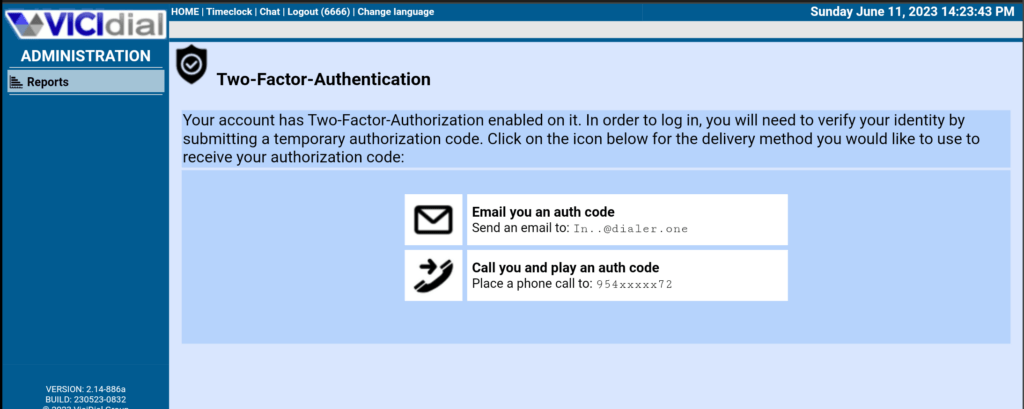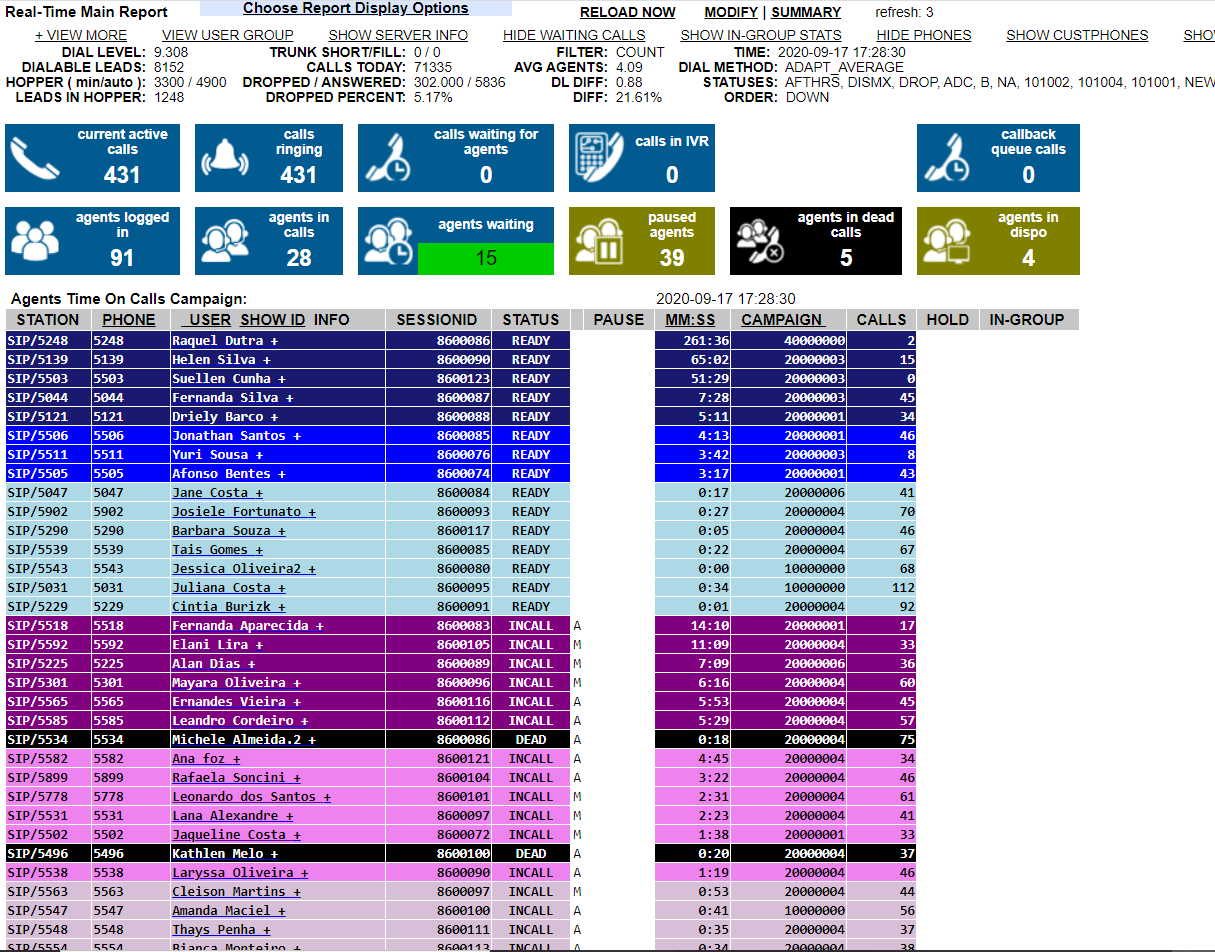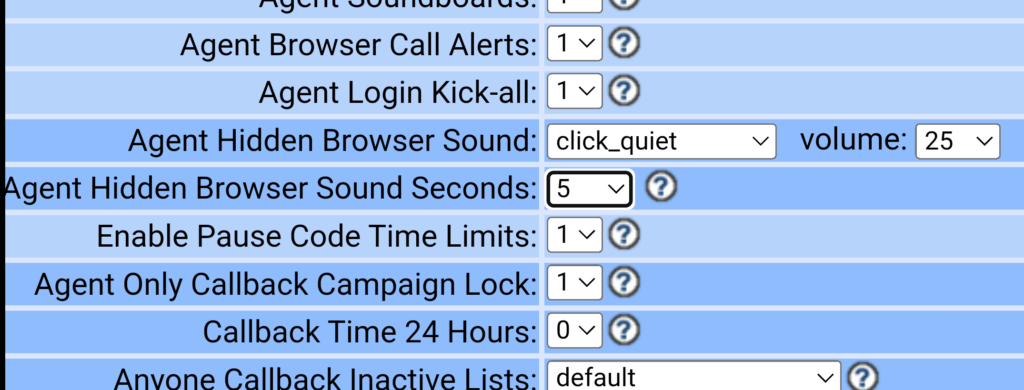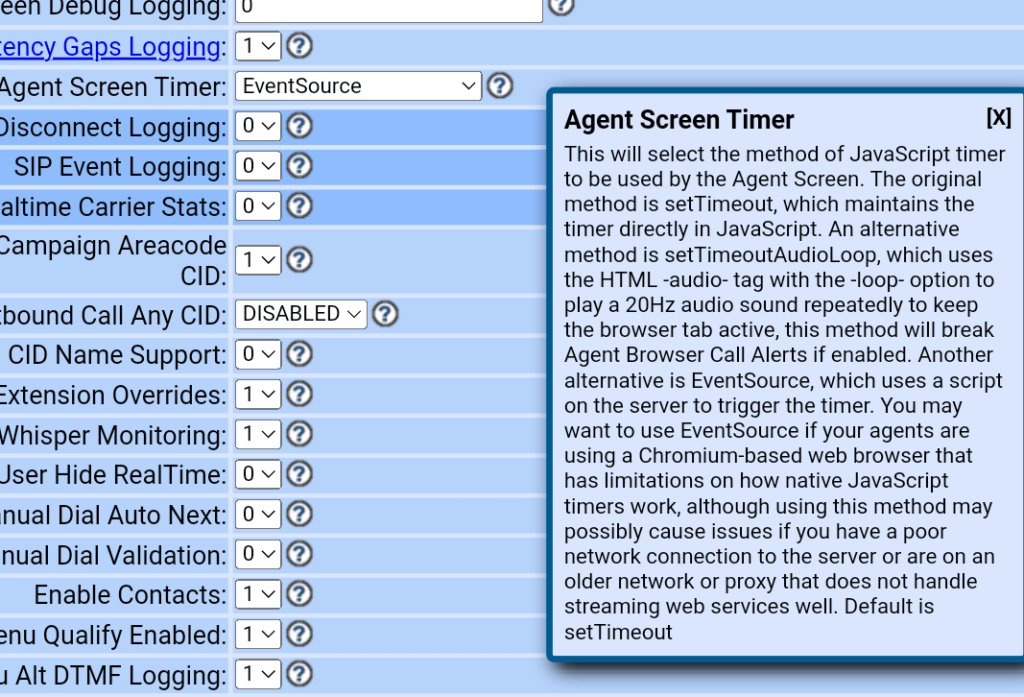How to – Upgrade your Vicidial Database from 2.2 all the way up to 2.14 & all versions in between
This article is going to go over how to upgrade your ViciDIal database as far back as 1.1.12-3 all the way up to the current 2.14 and every step in between. No matter what version of Astguiclient you have, this post will show you how to step yourself up, one upgrade at a time until you get to the version you want to be at. It will also show you what was added to each GUI version starting from day one.
########## UPGRADE
NOTE: Upgrading from 2.11 to 2.13 is below the first section
NOTE: Upgrading from 2.9 to 2.11 is below the first section
NOTE: Upgrading from 2.7 to 2.9 is below the first section
NOTE: Upgrading from 2.4 to 2.7 is below the first section
NOTE: Upgrading from 2.2.1 to 2.4 is below the first section
NOTE: Upgrading from 2.0.5 to 2.2.0 is below the second section
NOTE: Upgrading from 2.0.4 to 2.0.5 is below the third section
NOTE: Upgrading from 2.0.3 to 2.0.4 is below the fourth section
NOTE: Upgrading from 2.0.2 to 2.0.3 is below the fifth section
NOTE: Upgrading from 2.0.1 to 2.0.2 is in the next section
NOTE: Upgrading from 1.1.12-3 to 2.0.1 is at the bottom
#### UPGRADING FROM 2.13 TO 2.14
OPTIONAL STEPS(But highly recommended) – Backup existing system:
- Run this for a 1-server system or server with database on it:
(this may take hours on large system)
/usr/share/astguiclient/ADMIN_backup.pl –debugX
- Run this on dialer/Asterisk-only servers:
(do not run this if you only have one server):
/usr/share/astguiclient/ADMIN_backup.pl –debugX –without-db –without-web
REQUIRED STEPS!!!
- Check system_settings, make sure you are at DB Schema Version 1478 or higher
If not, run the instructions for 2.11 to 2.13 before this section.
- upgrade the MySQL asterisk database(you have two options):
A. Running the upgrade file directly from Linux:
mysql -f –database=asterisk < /path/from/root/extras/upgrade_2.14.sql B. Going into mysql and executing the upgrade sql file:
mysql
use asterisk
. /path/from/root/extras/upgrade_2.14.sql
quit
- install new files:
perl ./install.pl
NOTES: If you have customized any scripts in the bin or agi folders,
then make sure you back them up before running the install.pl script.
This script will replace existing files in the astguiclient installation.
- For each of your ViciDial servers, go the Admin -> Servers -> Modify Server
page and set each one to “Rebuild conf files = Y” and click submit.
This will rebuild the conf files to ensure any changes are updated.
- On one server only, update your phone codes data:
/usr/share/astguiclient/ADMIN_area_code_populate.pl –purge-table –debug
OTHER CHANGES:
- Added AST_inbound_export.pl script for in-group call data exports
- Added cm_sc_areacode.agi script that allows you to use a Settings Container
with the script in a Call Menu to define different destinations for
customers from each state to go to: DID, CALLMENU, EXTEN
- Added Agent DID Report
- Added the ability for internal chats to have more than one agent participant
- Added cm_phonesearch.agi script that can search for a phone number within the
system and redirect a call to an in-group that is defined as the Default
Transfer Group in a campaign that the lead belongs to. This must be
configured in a Call Menu
- Added In-Group option to populate new leads with a DID descriptive value in
the province field of the new lead.
- Added cm_sc_send_url.agi script for Call Menus on calls tied to a lead_id to
send a URL defined in a Settings Container.
- Added phone_number_log Non-Agent API export function
- Added api_only_user User option to prevent access to admin and agent screens
by an API-only user account.
- Added logging of API request URLs
- Added campaign setting for Dead Call to Dispo Only, to allow the Dead Call
Max Seconds setting to send the agent to the dispo screen
- Added web lead loader duplicate check options to check for leads loaded only
within the last 90-days. Also added to Non-Agent API add_lead function.
- Added Agent API function switch_lead to switch the active call lead_id while
the agent is on a live inbound phone call.
- Added In-group areacode_filter feature, allowing you to drop calls after a
set number of seconds in queue that either match or do not match a list
of areacodes defined per in-group.
- Added new DNC options to Manual Dial Filter campaign feature that are not
tied to the campaign DNC settings.
- Changed Emergency Logout processes to hangup all agent session calls, and
added better logging
- Changed Custom Fields of SCRIPT type to allow URLs and urlencoded variables
when using –U– and –V– to declare variables
- Added option for custom list fields to be required for all calls or only
inbound calls. Will prevent agent hanging up call if field is not filled
in. Must also have campaign option enabled for it to work. Will work for
the following custom field types:
TEXT, AREA, DATE, SELECT, MULTI, RADIO, CHECKBOX
- Added admin Automated Reports section, allowing easier web configuration of
scheduled reports being sent by Email or FTP.
- Added campaign option to validate transfer agent list based upon which
AGENTDIRECT in-groups those agents had selected.
- Added In-Group option to look up the state based upon the areacode of the
caller ID phone number of the person calling in.
- Added CHAT option to Inbound Queue No Dial campaign setting to prevent
outbound auto-dialing if a chat is waiting for an agent
- Added qualify option to phones for IAX type phones
- Added Pause Code Time Limits to allow you to set a time limit on the number
of seconds an agent can be in a specific pause code before the real-time
report will show them in a different color.
- Added Drop Lists feature, allowing you to add new leads to a list built from
DROPped calls from inbound groups on a scheduled basis.
- Added USER_CUSTOM_ options to campaign custom callerID setting to allow for
custom caller IDs to be used per agent in MANUAL and INBOUND_MAN modes
- Added IP Lists feature, allowing creating of lists of IP Addresses that can
be used as whitelists on a User Group basis for Agent, Admin and API
web resources.
- Added campaign option(with user override) Ready Max Seconds Logout to log an
agent out of the agent screen if they have been in a ready state for
more than X seconds.
- Added cm_fpg.agi script to allow callers to place their phone numbers into a
Filter Phone Group. Works from a Call Menu.
- Added Inbound and Advanced Forecasting Reports. Both use the Erlang formulas
and past data to forecast agent and call metrics.
- Added campaign option for Callbacks Display Days which can limit the
scheduled callbacks displayed to an agent by a number of days from now
- Added campaign options to stop recording when a 3-way call is started and
start recording when the hangup xfer line button is clicked
- Added start call URL feature support for manual dial calls
- Added logging of Real-Time report monitoring, and report in Admin Utilities
- Added Agent Push Events, allowing for HTTP Push events to be sent on agent
screen events. See the AGENT_EVENTS.txt doc for more details.
- Added Add-to-hopper options to update_lead function in the Non-Agent API
- Added basic one-way Cross-Cluster-Communication feature. Allowing for lead
information to pass from one VICIdial system to another with a call.
See the CROSS_CLUSTER_COMMUNICATION.txt document for more information.
- Added Real-Time agent status of “DIAL” for agent manual dial calls after
they have been placed but before they have been answered.
- Changed password fields to allow up to 100 character passwords. Also changed
password recommendations to emphasize length over complexity.
- Added logging and notification of 3-way call hung up in agent screen.
- Added URL logging of Agent Screen Webform button clicks and URLs
- Added AST_agent_wait_check.pl script to send out emails if there are agents
waiting more than X seconds.
- Added In-Group option to ask callers if they would take a survey after
agent has handled their call. Overrides agent HANGUP CUSTOMER button
to send call to survey instead.
- Added system setting to allow Lead Management admin utilities to handle
active lists. Also changed Advanced Lead Management tool to allow
you to select multiple lists.
- Added Inbound DID Summary Report
- Added Agent Inbound Status Summary Report
- Added experimental support for Asterisk 13. See the ASTERISK_13.txt doc
for notes on changes needed to get it to work.
- Added System Settings option to set lists to inactive once they pass their
expiration date
- NEW REQUIREMENT!!! Perl CPAN Net::Telnet version 3.0.4(April 21, 2013)
If you are using an older Net::Telnet version, you will need to upgrade!
this should take just two commands: “cpan” and “install Net::Telnet”
- Added DID System-wide filter option to System Settings
- Added DNC.COM inbound number filtering with DNCcom_inbound_filter.php
- Added cm_cid_change.agi script to alter the CID of calls in the Call Menu
Prompt. Also, added ability for cm_dnc.agi to recognize Vicidial-tagged
calls and update lead records without lookups from a phone number
- Added Webphone Layout option in Phones and override in User Groups
- Added campaigns-scheduled_callbacks_email_alert option to send email alerts
to agents when scheduled callbacks are triggered while they are logged
in to the agent screen. Read the HELP for instructions to set up.
- Added new Real-Time Whiteboard multi-report
- Added the ability to include duplicate custom text fields in a custom fields
form in the agent screen.
- Added Max Inbound Calls Outcome to allow for different behaviors when an
agent reaches their maximum inbound calls for the day
- Added campaign option to allow agents to pause the Manual Dial Auto Next
feature
- Added ability to display inbound email messages in Script tab scripts.
- Added dispo_change_status.php script to allow changing of a lead’s status
to a different status after it has been dispositioned as a specified
status a set number of times.
- Added Agent Screen Time Report campaign option, to display agent time
statistics in the agent screen for the current day.
- Added List Override setting for Default Transfer Group
- Added lead_status_search Non-Agent API function
- Added “Next-Dial My Callbacks” campaign setting that will automatically dial
USERONLY Scheduled Callbacks for agents in MANUAL or INBOUND_MAN
no-hopper campaigns when they click DIAL NEXT NUMBER in the agent screen
- Added “Anyone Callback Inactive Lists” System Setting option to determine
how ANYONE scheduled callbacks from inactive lists should be handled.
- Added “Inbound No-Agents No-Dial” Campaign setting, checks if any agents are
ready and waiting for phone calls from listed In-Groups before allowing
outbound auto-dialing.
- Added new PRESS_CALLBACK_QUEUE option to Hold Time and Wait Time In-Group
settings, allowing for a customer to retain their place in line in the
queue and be called back when their turn is reached.
- Added new Closed Time features to In-Groups that allow all calls in queue
to be presented with an option when the in-group closing time for the
day has been reached. Also, an option was added to manually force the
end of all queueing of calls for an in-group for the day.
- Added dial_ingroup option to Agent API external_dial function.
- Added In-Group option to look up timezone of customer when a new lead is
added during the routing of the call.
- Added the Outbound Lead Source Report
- Added basic GDPR features for lead activity download and delete. Must enable
System setting and user permission to use.
- Added CID Groups, allowing for groups of caller IDs to be defined by state
or areacode, and allowing a single CID Group to be set across multiple
campaigns.
- Added NO_READY option for no_agent_no_queue in-group feature.
- Added campaign option “Script on top of Dispo” to allow the agent screen
script tab to cover the dispo screen after hanging up the customer to
allow for Agent-API-enabled IFRAMEs to control the agent dispo process.
- Added feature to allow for bulk change of campaign and in-group ranks and
grades in the User Modify page.
- Added “Admin Lead Source ID Display” System Settings option to allow Modify
Lead page modification of Source ID field, and display in hopper list.
- Added LOCALFQDN trigger for webforms and script Iframes to allow for use of
absolute URLs on multi-home networks. See CALL_URL_FEATURES.txt doc.
- Added update_did Non-Agent API function
- Added pause code manager approval option, requires a manager to approve a
specific flagged pause code before the agent is allowed to use it in
their agent screen. Manager approves by entering their login credentials
into a window on the agent’s screen.
- Added DISPO_FILTER Settings Container option allowing for match-and-replace
function in Dispo Call URLs. See CALL_URL_FEATURES.txt doc for details.
- Added populate_lead_vendor and populate_lead_source options for In-Groups.
- Added In-Group option to override the Park Music-on-Hold.
- Added SWITCH custom field type to put buttons on the agent FORM to allow for
the form to be switched while on an active call.
- Rewrote HELP display in web admin screens to function as database-driven
javascript popup.
- Added per-user options for maximum number of outbound manual dial hopper
calls per-hour and per-day.
- Added In-Group option for Waiting Call On/Off URL, which we added to allow
a client to control a web-power-switch to turn lights on and off if
there are any calls waiting in an In-Group.
- Added In-Group option for Enter In-Group URL, which can send a URL request
when a caller enters an In-Group right before the system looks for an
agent to send the call to.
- Added Manual Dial Routing Initiated Recording, must enable setting at the
campaign level and have a 0 recording delay.
- Added campaign features for Dead Call Trigger. Allowing an audio alert to be
sent to an agent and/or a back-end URL to be submitted when an agent has
been in a dead call for X number of seconds.
- Added the ability for customers to be able to enter a new phone number to be
called back on for the CallerID CallBack Queue feature.
- Added the new Callmenu Survey Report(linked as “Callmenu Agent” in Reports).
- Added “Agent Screen Logout Link Credentials” System Setting to change the
agent screen logout page login link to not include user credentials.
- Added new campaign feature to force agents to call back their triggered
USERONLY Scheduled Callbacks.
- Added new campaign feature to automatically reschedule ANYONE callbacks when
they are dispositioned as a non-Human-Answered status flag status.
- Added new campaign feature to allow agents to select a specific timezone to
use when scheduling callbacks. For this to work, the Phone Codes must be
updated on your system using the following command:
/usr/share/astguiclient/ADMIN_area_code_populate.pl –purge-table –debug
- Added new ‘force_fronter_leave_3way’ Agent API function, allowing an API
command to be sent to the fronter of a call to leave-3way their call.
- Added List Daily Reset Limit option, only editable by level 9 users.
- Added 3-Way Volume Buttons campaign setting to allow disabling of volume
and mute buttons in the LIVE CALLS IN YOUR SESSION panel during a 3-way
call.
- Added campaign setting to filter ANYONE Scheduled Callbacks by the DNC
settings set in the campaign
- Added _wait_time options to Next Agent Call settings for Campaigns and
Inbound Groups.
- Added External Web Socket URL option so a WebRTC phone can be used outside
a network if the Phone is set to Use External Server IP = Y
- Added SYSTEM options to the campaign detail Manual Dial Filter feature
- Added lead_callback_info Non-Agent API function, it outputs scheduled
callback data for a specific lead
- Added Manual Dial Validation campaign and system settings, forces agent to
manually enter in the phone number before a call is placed. Does not
affect 3way calls or transfers.
- Added alphabet letters translation to phone DTMF digits feature in Agent
Screen. For example, Putting “SMITH” in the SendDTMF field would result
in “76484” being sent over DTMF.
- Added “force_fronter_audio_stop” Agent API function, allowing an API
command to be sent to the fronter session of a closer call to stop
playing of an audio_playback pre-recorded audio stream
- Added options to define the static prompts to use for the Inbound Group
“Play Place in Line” feature
- Added new web pages for mobile application
- Added feature allowing agents to mute recordings of calls from the agent
screen. Must be enabled in System Settings to be able to use it in
campaigns. There is also a User Override option.
- Added more options to the Campaign “Hide Call Log Info” feature to be able
to show only the last X number of calls in the Lead Info screen. Also
added a User Override setting for this feature.
- Released VICIdial Manager Manual version 2.14-704a:
http://www.vicidial.org/store.php#MANAGER
- Added more logging for Asterisk AMD as well as beta AMD patch for logging
of NOAUDIODATA answered calls and more AMD stats gathering. Also added
an AMD Log Report to the Admin Utilities page.
- Added Admin User Redirect URL settings, which allows you to define a web
address that a user is to be sent to when they log in to the admin web
screen. This is usually used for level 7 report only users to send them
to one specific report when they log in without seeing the admin web
screen at all. Must be enabled in System Settings.
- Added experimental SIP event logging. Requires patched Asteirsk 13 and
newer version of MySQL/MariaDB. Must be enabled in System Settings and
each dialer’s astguiclient.conf/extensions.conf/manager.conf files
Read SIP_EVENT_LOGGING.txt doc for more details
- Added new Non-Agent API function ‘update_cid_group_entry’ which allows you
to add/update/delete/info CID Group entries and AC-CID entries
- Added new Non-Agent API ‘custom_fields_copy’ option to the ‘add_list’
function
- Added new Call Quota Lead Ranking recycling feature-set. A new and
completely different way to do lead recycling for outbound campaigns.
See the CALL_QUOTA_LEAD_RANKING.txt document for more info
- Added bench_agent_assign.php script to allow managers to move
‘owner-assigned’ to another agent.
- Added User Inbound Max Calls filtering options. Allowing selective counting
of inbound calls excluding calls involving set in-groups, statuses and
with a minimum time threshold. Also, new in-group routing options based
on last non-filtered call times
- Added System Settings option for second agent screen script tab
- Added a Campaign option for VoiceMail Message Groups, allowing agents to be
able to select a message to transfer a customer answering machine to
from a list of pre-recorded messages that can be defined by time-of-day.
- Added a Campaign option to not send an agent immediately to the disposition
screen after transferring a customer call to a VoiceMail Message.
- Added Campaign option for Dial Timeout Lead overrides, allowing you to set
up a Settings Container with values for manual-dial and/or auto-dial
lead fields and associated values that will tie to different
Dial Timeouts.
- Added LTMGAD and XAMMAD Campaign Hotkey options that will transfer to the
Leave-Voicemail option as well as dispositioning the call.
- Added a per-User option to define an additional Status Group of call
statuses that agents can use to disposition all calls they handle.
- Added System Setting to hide the first web form button on the agent screen.
- Added System Setting options for alternate agent screen recording buttons.
This includes different wording, different sizes and removing the blank
space below the recording buttons.
- Added ability to play multiple audio prompts for outbound survey campaigns
and to use DYN for lead field wildcards defined as audio prompts.
- Added ability to limit the number of voicemail messages played to a single
lead per day, as a campaign setting.
- Added CID Group Type of NONE to allow for a group of outbound CIDs to be
used for all outbound phone calls no matter where they are.
- Added Auto-Rotating CID Group numbers, allowing for timed automatic cycling
of CID numbers, one-at-a-time, within a CID Group.
- Added optional OpenSIPs CallerID Name settings, for use only with systems
that use an OpenSIPs server to route outbound calls where this feature
has been enabled.
- Added system settings option to require passwords of a set minimum length.
This setting affects User passwords, Phone and Server registration
passwords and the System Settings default passwords.
- Added support for KHOMP Answering Machine Detection. This is a 3rd-party
commercial(paid-for) solution. The code and documentation can be found
in the “extras/KHOMP” directory of the codebase.
- Added AMD Agent Route Options as a campaign option allowing you to set
the specific AMD responses for calls that should be routed to agents
- Added the “list_custom_fields” Non-Agent API function, to show all list
custom data fields in a list/all-lists.
- Added an optional “send this user a login link email” link to the User
Modify page to send a shortcut URL link for the agent to more easily
log into the agent screen. Must be enabled in System Settings.
- Added new System Settings option to allow sending of any CallerID through
the Agent API for external_dial outbound calls.
- Added system setting to allow you to restrict Admin Phones display to a
set number of records per page.
- Added options at the campaign and in-group levels to allow you to play
alert sounds when a call arrives in the agent’s session, in the agents’
web browser that they are logged into the agent screen with. Must be
enabled in system settings.
- Added “3-Way Recording Stop Exception” campaign option to override the
“3-Way Recording Stop” setting based upon the 3way phone number dialed.
- Added the ability to use Automated Reports with standard SFTP and FTPSSL
remote servers.
- Added the ability to configure when the Answer signal is sent to inbound
calls at the DID, In-Group and Call Menu level. For this to work, you
must set the conf files to be rebuilt after upgrading your systems.
- Added options for HTML formatting and UTF-8 charset in emails through the
dispo_send_email.php script.
- Added tools for International DNC phone number scrubbing. See the
INTERNATIONAL_DNC_SCRUB.txt doc for more information.
- Added option ‘2’ to the User Modify “Modify Leads” setting allowing admin
users to modify all lead fields except for phone number and alt phone.
- Added campaigns_list & hopper_list functions to the Non-Agent API
- Added code and instructions for multi-campaign outbound agents, see the
AGENT_MULTI-CAMPAIGN_DIALING.txt doc
- Added Screen Colors option to set the submit button color on the admin
screens and reports.
- Added the ability to modify the status of any call or agent log in the
Admin Modify Lead page. Must use new ‘Modify Leads’ options to enable
for a user.
- Added system settings allowing you to remove digits from the beginning of
a phone number when it is manual dialed or through the web lead loader.
- Added Pause Max Exceptions campaign setting, allowing for exceptions to the
Agent Pause Max feature for specified Pause Codes.
- Added optional display of parked call stats and SLA 1&2 percentages to the
Real-Time Report
- Added Campaign setting for Hopper Drop-Run triggering. Forcing the one-time
hopper insertion of DROP status leads instead of standard hopper loading
- Added Agent API function ‘vm_message’ allowing you to set the VM message to
be played to a customer when the agent clicks on the VM button in the
agent screen.
- Added Daily Called Count Limits as a campaign setting, with options to
count and/or restrict for manual dial calls or not.
- Added Transfer-Conf Button Launch campaign setting, allowing you to set a
webform window to open when an agent clicks on the Transfer-Conf button.
- Added SHARED_… campaign dial method auto-dial options, for more efficient
agent multi-campaign dialing. Read the AGENT_MULTI-CAMPAIGN_DIALING.txt
document for more information.
- Added Agent Search Method override options for campaigns and in-groups.
- Added ‘copy_user’ function to the Non-Agent API.
- Added ‘add_did’ function to the Non-Agent API.
- Added new SOURCESELECT Custom Field Type, it is a single-selection pull-
down menu where there are multiple sets of options available depending
on the value of another field for the lead. Also added the ability to
perform basic Math functions within a SCRIPT Custom Field using values
from other fields in the equations. For more information on how both of
these new features work, see the Field Options help in the admin web
screen.
- Added Phone Defaults system setting, allowing you to set many default
values when adding new phones through admin.php. Also added a Copy New
Phone admin web function.
- Redesign of QC module, with new QC scorecards, the ability to do QC by
Campaign/List/In-Group, new reporting and more. See the
docs/QC_PROCCES.txt document for more information.
- Added the BUTTON Field Type option to Custom List Fields. Allows you to add
a button to the form that will commit any changes made in the form and
automatically reload the form.
- Added Two-Factor Authentication(2FA) as an option for the admin web screens
This adds a required second step to the admin web screen login process
through a method other than a password, such as: an Email, Phone Call or
Text-Message(SMS). This 2FA auth also lasts only a set amount of time
(defined in System Settings[number of hours, from 1-9999 hours]), or
until the user logs out. For more information, read the
2FA_TWO_FACTOR_AUTHENTICATION.txt document.
- Added a page to allow Editing existing Lead Loader Templates.
- Added System Settings for “Agent Hidden Browser Sound” to repeatedly play
a selected sound at a set interval to an agent when their Agent Screen
is hidden from view. Can be used to disable web browser javascript
throttling if set to an audible sound at a 20 second interval. Tested
with the ‘click_quiet’ sound file at a volume of ’25’.
- Added WAV audio file validation for Audio Store, and display of badly
formatted WAV files in the audio chooser in admin.php
- Added “Leave 3-Way Start Recording” campaign feature that will start a new
recording after the agent clicks on the LEAVE 3WAY button and leaves the
call. Also includes an “Exception” option to disable/enable only for
specific 3-way call numbers.
- Added “Populate Lead Comments” In-Group option, allowing configuration of
how the ‘comments’ lead field is filled-in when a new lead is inserted
because of an inbound phone call.
- Added options to add/update/delete custom fields within the ‘update_list’
function of the Non-Agent API.
- Added Settings Compare Utility page to Admin Utilities to allow you to
compare the settings from two records in your system and see what
settings are different between the two.
- Added campaign options to add extra lead-field columns to the “Calls In
Queue” panel in the agent screen.
- Added Calls In Queue Count Display campaign options, allowing for two
separate Calls Waiting counters at the top of the agent screen, each
with separate configurable labels and in-group/campaign parameters.
Also, this can be used with the alt_display.php script.
- Added new “Music on Hold Suggest” Phones setting for SIP and IAX phones.
It will define the Hold music played to a customer when the phone user
puts them on hold through the phone.
- Added compatibility with TILTX STIR/SHAKEN Call Shaper pre-carrier call
filtering service. Read the TILTX_SHAKEN_API.txt doc for more info.
- Added In-Group Drop Seconds Override Container, allowing for overriding of
the Drop Seconds setting based upon the day of the week and time of day.
- Added Inbound Manual Dial Agent Forced Ready features allowing for forcing
agents in INBOUND_MAN dial method campaigns to be in the READY state
(able to take inbound calls) for a set amount of time before they are
able to click on the DIAL NEXT NUMBER button each time. Also allows for
an override setting based upon the day of the week and time of day.
- Added CORS(Cross-Origin Resource Sharing) support for the VICIdial agent
PHP scripts and select admin PHP scripts. see the CORS_SUPPORT.txt doc
for more information.
- Added Transfer No Dispo campaign setting, allowing for transferred calls
to not immediately show the disposition panel on the agent screen.
- Added User override setting for campaign Manual Dial Filter option.
- Added display of active Call Time Holidays in the agent screen Scheduled
Callbacks calendar panel.
- SECURITY NOTE: For agent screen Webform buttons, we have changed the
default behavior to not include user credentials in non-custom URL
strings unless you set the new agc/options.php settings to do so:
“$user_pass_webform and “$phone_login_webform”
See the “agc/options-example.php” file for more information.
*This will not affect custom webform query strings that start with “VAR”
- Added display of the Phone Codes and Postal Codes that are loaded into the
system. Linked from the System Settings page.
- Added 24-Hour Called Count Limit campaign feature, allows you to limit the
number of calls to be placed to a phone number or lead in a 24-hour time
period. Also allows for state-based override settings. For more
information, read the CALL_COUNT_LIMITS.txt doc.
- Added CID Group Failover setting for campaigns, to allow for backup CID
Group to use if no AREACODE or STATE match found from first CID Group.
- Added agc/dispo_list_quota.php script to deactivate lists once a limit of
the number of leads matching set statuses is reached. See the comments
in the code for more details.
- Changed agc/dispo_send_email.php to only allow attachments in the new
“agc/attachments” web directory.
- Added Asterisk 16 “PJSIP” compatibility
- Added ‘batch_update_lead’ Non-Agent API function
- Added ‘Agent In-Call Tally Seconds Threshold’ campaign setting, to better
handle dialing volume on campaigns with long agent talk time.
- Added ‘In-Queue No Agents Check’ in-group setting, to allow for checking of
logged-in or available agents for the in-group while calls are in-queue,
and if there are no agents available, sending the customers to the
No-Agent-No-Queue Action. With configurable pause code exceptions.
- Added MIN LENGTH to the Dispo Call URL ALT admin screen, allowing for a
minimum call time threshold before a Dispo Call URL will trigger.
- Added User Location to the Modify User page. Also added Queue Groups Admin
pages, allowing you to define multiple campaigns and/or in-groups in a
single Queue Group to be used in some reports.
- Added Campaign and List options for “Auto Alt-Number Dialing Threshold”
allowing you to stop auto-dialing alternate phone numbers for a lead
after a set number of call attempts, and thereafter only dialing the
main phone number for the lead.
- Added ‘update_alt_url’ Non-Agent API function
- Added “Pause Max URL” Campaign feature
- Added “Allow Web DB Debug” System Settings feature, to allow use of the $DB
variable on the web screens for troubleshooting issues.
It is disabled by default.
- Added List CID Group Override to the List Modification admin screen.
- Added “Pre-Filter Recent Call” DID feature, to be able to filter out
inbound calls based on the caller phone number and whether it had been
called(or had called in) within the last X number of days.
- Added the “Inbound DID Detail Report” to the Admin Utilities page.
- Added Beta support for ConfBridge Asterisk Conferencing engine. See the
“/extras/ConfBridge” directory for more information.
- Added Beta support for VERM(the VICIdial Enhanced Reporting Module),
accessible from the “Reports -> Admin Utilities” page.
- Added User Group “Script Override” option, with per-campaign activation.
- Added “Webphone Settings” option to Phones, allows for more WebRTC config
options to be set through a Settings Container.
- Added “Agent Call Hangup Route” campaign settings, allowing you to send
calls that an agent is finished with to a Call Menu, In-Group or a
pre-recorded message before hanging up the call. NOTE: After upgrading your system, be sure to set each dialer to "Rebuild conf files" = 'Y' for this feature to work properly.
- Added instructions and scripts for creating a Gateway Recording server
See the GATEWAY_RECORDING_SERVER.txt doc for more info.
- Added the ability to have multiple “No Agent Call URL” entries for a
single Campaign/In-Group/List, by putting “ALT” in the No Agent Call URL
field on the Campaign, In-Group, List modify screen. Just like how it
works with Dispo Call URL currently.
- Added new User Group <93>Script Tab Frame Location<94> allowing the script tab
to extend to the far left side of the screen.
- Added new campaign setting <93>Max Logged-In Agents<94>, allowing you to set a
maximum number of agents that can be logged into this campaign at any
time.
- Added list option for <93>Dial Prefix Override<94>.
- Added a <93>color chooser<94> for the In-Group Color and Screen Colors fields.
Also added color hex code validation to those fields.
- Added <93>Invalid Phone Number Replacement<94> option to the Web Lead Loader,
allowing you to replace an invalid phone_number lead value with either
the alt_phone or address3 value in the same lead.
- Added optional <93>Agent Login Kick-all<94> system setting which hangs up any
channels that were already in the agent session before the agent is
placed into the session.
- Added <93>User Codes Admin Pulldown<94> allowing only User Level 9 users to
modify the User Code field on the User Modify page, and it will change
the User Code field to a pulldown menu.
- Added “Show Confetti” campaign setting, allowing for confetti to be shown
to agents when they disposition a call as a SALE and/or a CALLBACK
flagged status.
- Added “Abandon Check Queue” feature, to catch dropped Call Menu calls that
are tagged with a Lead ID. For more information, see the bottom of the
INBOUND_CALLBACK_QUEUE.txt document.
- Added “Asterisk Restart URL” to the Modify Servers page, this can send a
URL request any time Asterisk is auto-restarted on that server.
- Added Agent API “send_notification” function, allowing you to send
notifications to agents by User, User Group or Campaign.
- Added “AMD Agent Route Options” flag to allow immediately hangup and dispo
of calls with no audio data. This is a campaign feature.
- Added agent screen latency logging, viewable in the Real-Time Report and
the new Agent Latency Report and Latency Gaps Report.
- Added Demographic Quotas, allowing for setting of quota goals for leads
based upon lead field values for demographic parameters like: gender,
age-group, political-party, etc… For more information on this set of
features, read the DEMOGRAPHIC_QUOTAS.txt document.
- Added Inbound Calls Credits, allowing per-User setting of a number of
inbound calls that can be handled, until reset by a manager.
- Added List Weekday Resets, allowing for automatic list resets scheduled by
day-of-the-week on a per-list basis.
- Added Second and Third Agent Alert Trigger In-Group settings, allowing for
a second and/or third audio alert to be played to the agent on repeat
calls.
- Added VIDPROMPTSPECIAL Call Menu Handle Methods when sending calls to
In-Groups. Allows for list-based In-Group routing based on settings in
a Settings Container. Also allows for separate routing of not-found
leads.
- Added Dead Call Stop Recording campaign feature.
- Manual VM Message Status Updates campaign option.
- Added Per Call Notes Required campaign option.
#### UPGRADING FROM 2.11 TO 2.13
OPTIONAL STEPS(But highly recommended) – Backup existing system:
- Run this for a 1-server system or server with database on it:
(this may take hours on large system)
/usr/share/astguiclient/ADMIN_backup.pl –debugX
- Run this on dialer/Asterisk-only servers:
(do not run this if you only have one server):
/usr/share/astguiclient/ADMIN_backup.pl –debugX –without-db –without-web
REQUIRED STEPS!!!
- Check system_settings, make sure you are at DB Schema Version 1403 or higher
If not, run the instructions for 2.9 to 2.11 before this section.
- upgrade the MySQL asterisk database(you have two options):
A. Running the upgrade file directly from Linux:
mysql -f –database=asterisk < /path/from/root/extras/upgrade_2.12.sql B. Going into mysql and executing the upgrade sql file:
mysql
use asterisk
. /path/from/root/extras/upgrade_2.12.sql
quit
- install new files:
perl ./install.pl
NOTES: If you have customized any scripts in the bin or agi folders,
then make sure you back them up before running the install.pl script.
This script will replace existing files in the astguiclient installation.
- For each of your ViciDial servers, go the Admin -> Servers -> Modify Server
page and set each one to “Rebuild conf files = Y” and click submit.
This will rebuild the conf files to ensure any changes are updated.
- On one server only, update your phone codes data:
/usr/share/astguiclient/ADMIN_area_code_populate.pl –purge-table –debug
OTHER CHANGES:
- Added System Settings to allow custom prompts on agent login and when an
agent leaves a 3way call in the agent screen. Must Have Asterisk 1.8+
for it to work.
- Added ability to use single-quotes in vicidial_list fields. Through the
agent screen and all lead import methods
- Added option to populate the entry_list_id from the DID when routing to an
In-Group
- Added agent screen webform 3 feature
- Added user API restrictions for allowed lists and allowed API functions
- Added web administration for chat features
- Added new campaign settings for Manual Dial Search and Manual Dial Filter to
allow for Alt phone and Address3 phone numbers to be allowed
- Added campaign option to disable the Manual Dial Override field
- Added option to change the background color for agent scripts
- Added option to hide the In-Group ID in the agent screen for inbound calls
- Added option to not populate the In-Group Name in the security_phrase field
(the “Show” field) of the vicidial_list table on new inbound leads.
- Added list_description as a webform and script variable
- Added campaign option to allow you to set the number of seconds after a
customer hangs up before the warning shows on the agent screen
- Added ability to use No Agent Call URL with the dispo_move_list.php script
see script comments for instructions.
- Added DID options to check for a Maximum number of calls in queue in a set
In-Group and route the call to an extension if over the set number.
- Added the ability to define multiple Dispo Call URLs as well as define
specific statuses that they will be triggered for.
- Added compatibility in the Vicidial code for Asterisk 11.
- Added database and logfile logging of DTMF events. Works with Asterisk
versions 1.8 and higher. If upgrading, you will need to add “dtmf” to
the listencron user in manager.conf and reload asterisk.
- Added agent screen debug logging, which will log almost all mouse clicks
and AJAX calls on the agent screen. Can be enabled for all agents or
only one agent. Also added report to display logs by date/time. These
agent debug logs are deleted after 7 days.
- Added agc/dispo_add_FPG.php script to be able to insert a phone number into
an inbound Filter Phone Group when set to a certain specific disposition
using the Dispo Call URL.
- Added campaign option to display some lead fields as read-only in the agent
screen. Those fields are: entry_date,source_id,date_of_birth,rank,owner
- Added option in the web-based lead loader to convert state names to their
two-letter abbreviations.
- Added option to Secondary Lead Sort by vendor lead code
- Added option to User Stats report to only show call logs with a specified
call status.
- Added experimental Agent Whisper Monitoring from the Real-time Report.
Must be enabled in System Settings.
- Added the ability in in-groups to set reset a lead’s called status when a
call is ended by being abandoned, dropped, hung up or sent to voicemail
- Added Admin -> Settings Containers to admin web interface to allow more easy
configuration of back end scripts and Dispo Email sending
- Added agc/dispo_send_email.php script to be used with the Dispo Call URL
option in campaigns and in-groups. See DISPO_SEND_EMAIL.txt doc for
more information on this feature.
- Added code to support proprietary encryption framework for custom fields.
- Added new User Group options for Allowed Reports to control the Report Page
Servers Summary and the Admin Utilities Page
- Added optional GPG audio recording encryption.
- Added option to use RECID as a recording filename variable.
NOTE: Cannot be used as the ONLY variable for recording filename
- Added functionality to adjust the input field lengths in the agent screen
and the admin modify lead pages to follow the database schema field
lengths for the default lead fields.
- Added DID custom fields as webform and script variables
(did_custom_one, did_custom_two,…, did_custom_five)
- Added option to hide users from appearing on real-time report. Must be
enabled in System Settings, then for each user to be hidden.
- Added did_carrier_description, sorting by columns in DID list page, integer
sort for user list page.
- Added logging of DNC list insertion and deletion to vicidial_dnc_log table
- Added AST_DB_DNC_filter.pl script to allow filtering of existing DNC entries
- Changed AC-CID to be able to use areacodes from 2 to 5 digits in length
- Added admin web interface to allow for easy linking and display of custom
reports that are not included in Vicidial
- Added Status Groups and the ability to override Campaign Statuses on a
per-In-Group or per-List basis
- Added Minimum and Maximum Seconds options for all status settings. This
allows you to prevent the use of a status by an agent if they have
talked to a customer less than X seconds or more than Y seconds.
- Added the system setting USA-Canada Phone Number Dialcode Fix which will
trigger a process that will run at the Timeclock End of Day that will
check all phone numbers to populate the dial code, or phone code, field
with a 1 if it is missing as well as remove a leading 1 from the phone
number field if it is present.
- Added –lstn-buffer option to keepalive script to run special enhanced
buffer version of the Listen process. Requires newer Net::Telnet perl
module version.
- Added Answering Machine Message Wildcards features for campaigns. Allows for
calls sent to a message to play a different message depending on whether
a wildcard text string is present in a selected lead data field.
- Added Cached Realtime Carrier Stats option to System Settings to have the
Carrier Log Stats generated once per minute system-wide instead of every
time the realtime report refreshes on every screen.
- Added option to several reports to search the archived logs.
- Added AST_DNCcom_filter.pl script which allows for direct batch filtering of
lists within vicidial with the DNC.COM dnc filtering service. For more
info, see the DNC-dot-COM_integration.txt document.
- Added phone options to have call go to dialplan extension instead of
voicemail if phone not answered.
- Added option in NVA agi script to search for a lead by phone number, log the
lead_id of the phone call and send a per-phone URL at the start of the
phone call.
- Added Chat Messaging to agent screen, with manager chat utlitity. For more
information, read the CHAT_MESSAGING.txt doc.
- Added example code for a CRM Iframe agent screen skin(extras/crm_iframe)
See the CRM_EXAMPLE_SKIN.txt doc for more information
- Added utility to gather and display Asterisk debug information. Includes
a server setting and Admin Utilities report.
- Added campaign setting for manual_dial_timeout for manual dial agent screen
calls only.
- Added Agent Allowed Chat Groups to User Groups to allow restriction of only
agent to agent chatting by itself.
- Added options in In-Groups and Campaigns to allow for the agent recordings
to be initiated by the routing process instead of at the agent screen.
This only works for inbound and auto-dial outbound calls for in-groups
and campaigns that are set to ALLCALLS or ALLFORCE recording.
- Added option to Inbound DID Group Filtering to filter by areacode.
- Added in-group option for On-Hook CID Number.
- Added available_agents and status_link button options as well as validation
of active in-group to the chat_customer screen.
- Added campaign setting Manual Dial Hopper Check that will check for a lead
in the hopper with the same phone number as any manual call being
placed from the agent screen, and if one exists it will be deleted
before the manual dial call is placed.
- Added recording access logging per user(must be enabled in System Settings)
- Added ability to transfer customer chats to another chat group or agent
- Added API Log Report to Admin Utilities page
- Added Alternate IVR(Call Menu) Logging options
- Added option to define a carrier across all active asterisk servers
- Added campaign option to move USERONLY scheduled callbacks to ANYONE
callbacks after X minutes being LIVE without the agent calling them
back.
- Made several changes to the admin web screen and real-time report designs
- Added options to define color scheme and logo for admin web screens
- Added new options to enable the recent changes to the UK OFCOM Drop Rate
calculations. There is a new System Setting to enable on the system,
and then each affected campaign must also have the new option enabled
for it as well. Affects the predictive algorithm and the Real-time and
Outbound Calling reports.
- Added phone outbound alt caller ID to allow for phone-dialed calls to use
a separate CID number when dialing through a specific context
- Added display of admin change differences to last change on the change
detail page
- Added the ability to copy audio store files with a new name
- Started process to redesign the Agent Screen, added Screen Colors
definitions, removed san-serif fonts, changed loading/login/logout
screens, logging of browser width/height.
- Changed HTML Reports to use dynamic charting Javascript elements
- Added campaign option to automatically manual dial next number in agent
screen after X seconds. Must be enabled in System Settings.
- Added recording filename option to update filename post-call with select
variable values, uses options in AST_CRON_audio_1_move_VDonly.pl script
- Added ALT Multi Dispo URL option to restrict URL sending by list ID.
- Added Admin Bulk Tools page, linked from Admin Utilities page
- Added customer chat options for logo/colors and a survey link after chat is
completed.
- Added the User Group Hourly Report
- Added User List NEW Lead Limits, with User overrides. Allows you to set a
limit on the number of NEW status leads that an agent can call on a per
list basis per day. Also allows overall NEW limits across all lists for
a user per day
- Added List Merge admin utility
- Added Fronter – Closer Detail Report
- Added option to allow agents to park 3way calls in the agent screen
- Added option to web lead loader to restrict leads to only those with a
phone number of a specified length. Options for forced system-wide and
per-list-load
- Added more options to the Callback moving utilites in Admin Utilities page
- Added Agent Audio Soundboards
#### UPGRADING FROM 2.9 TO 2.11
OPTIONAL STEPS(But highly recommended) – Backup existing system:
- Run this for a 1-server system or server with database on it:
(this may take hours on large system)
/usr/share/astguiclient/ADMIN_backup.pl –debugX
- Run this on dialer/Asterisk-only servers:
(do not run this if you only have one server):
/usr/share/astguiclient/ADMIN_backup.pl –debugX –without-db –without-web
REQUIRED STEPS!!!
- Check system_settings, make sure you are at DB Schema Version 1378 or higher
If not, run the instructions for 2.7 to 2.9 before this section.
- upgrade the MySQL asterisk database(you have two options):
A. Running the upgrade file directly from Linux:
mysql -f –database=asterisk < /path/from/root/extras/upgrade_2.10.sql B. Going into mysql and executing the upgrade sql file:
mysql
use asterisk
. /path/from/root/extras/upgrade_2.10.sql
quit
- install new files:
perl ./install.pl
NOTES: If you have customized any scripts in the bin or agi folders,
then make sure you back them up before running the install.pl script.
This script will replace existing files in the astguiclient installation.
- For each of your ViciDial servers, go the Admin -> Servers -> Modify Server
page and set each one to “Rebuild conf files = Y” and click submit.
This will rebuild the conf files to ensure any changes are updated.
- On one server only, update your phone codes data:
/usr/share/astguiclient/ADMIN_area_code_populate.pl –purge-table –debug
OTHER CHANGES:
- Added User setting for Wrapup Seconds Override
- Added new Agent API function audio_playback to play audio files from the audio
store in an active agent session. See AGENT_API.txt doc for more info.
- Added option to DIDs to allow routing of calls to a redirect extension if
there are no agents available in a specific in-group
- Added option to DIDs to allow pre-filtering by a specific filter phone group
before the standard filtering process. The call can be redirected to a
specific DID entry if there is a match.
- Added Wrapup Bypass option to allow or disallow agents to skip the wrapup
screen before the timer is finished. Also added the option to use a
system Script as the Wrap Up Message
- Added $RS_droppedOFtotal options.php option for the realtime report to allow
the drops to be calculated out of Total calls instead of just Answers
- Added ability to use Wrap-Up messages with calls terminated through Hotkeys
- Integrated all QC code into standard admin code, removing includes as well
- Added System Setting option to use 24-hour time for callback setting in agent
screen.
- Added User Group viewable report entry for Front Page System Summary
- Added archive log search and display in modify lead page
- Added campaign options to limit number of active callbacks
- Changed all Agent and Administrative interface text output to use a function
instead of echo.(for dynamic other-language interfaces)
- Added Admin Utility to split lead lists into smaller lists
- Added campaign options to minimize QC audited comments without closing the
frame, allow for the comments field to appear under all agent screen
tabs and the dispo screen and the callback date select screen, allow
for the audited comments to be displayed with managers in red and with
a date/time stamp. Also, a campaign option to not display the Previous
Callback panel in the agent screen.
- Added campaign option to clear the script after call disposition.
- Added administrative web interface for managing Languages. The language
features are now active in the admin interface as well as in the agent
screen. Language files are available in the “translations” directory
in the source code, as well as on this website:
http://vicidial.org/translations/
- Added No Agent URL option override for Lists
- Added CPD Unknown Action option to Campaigns
- Added new user option to allow administrative users to search for leads
systemwide even in lists belonging to campaigns that the user’s User
Group settings don’t allow them to view
- Added Local Call Time option for Lists to further restrict call times
already set in the campaign.
- Added Manual Dial Lead Search Filter option to limit the search of manual
dials to within one campaign’s lists.
- Added NAME as an agent screen Status Display variable
- The PAUSE and RESUME buttons in the agent screen have been turned into a
single button named “You are paused” or “You are active” depending on
your status. Issue #814
- Added new LOCK options to Manual Dial Search Checkbox to prevent the agent
from checking or unchecking the search checkbox.
- Added case-sensitive user ID validation on agent login.
- Added option in phones and voicemail to display message counts on the
Admin Summary screen.
- Added Callbacks Bulk Move admin utility. Also changed behavior of the
removal links for callbacks from the callback hold displays for Users,
User Groups, Lists and Campaigns.
- Added DYN filename prefix for non-TTS dynamic files to be used for answering
machine message. For instance using DYN–A–user–B– for agent 1234
would look for a file named 1234.wav in your audio store to play.
#### UPGRADING FROM 2.7 TO 2.8 (2.9 release branch)
OPTIONAL STEPS(But highly recommended) – Backup existing system:
- Run this for a 1-server system or server with database on it:
(this may take hours on large system)
/usr/share/astguiclient/ADMIN_backup.pl –debugX
- Run this on dialer/Asterisk-only servers:
(do not run this if you only have one server):
/usr/share/astguiclient/ADMIN_backup.pl –debugX –without-db –without-web
REQUIRED STEPS!!!
- Check system_settings, make sure you are at DB Schema Version 1347 or higher
If not, run the instructions for 2.4 to 2.7 before this section.
- upgrade the MySQL asterisk database(you have two options):
A. Running the upgrade file directly from Linux:
mysql -f –database=asterisk < /path/from/root/extras/upgrade_2.8.sql B. Going into mysql and executing the upgrade sql file:
mysql
use asterisk
. /path/from/root/extras/upgrade_2.8.sql
quit
- install new files:
perl ./install.pl
NOTES: If you have customized any scripts in the bin or agi folders,
then make sure you back them up before running the install.pl script.
This script will replace existing files in the astguiclient installation.
- For each of your ViciDial servers, go the Admin -> Servers -> Modify Server
page and set each one to “Rebuild conf files = Y” and click submit.
This will rebuild the conf files to ensure any changes are updated.
- On one server only, update your phone codes data:
/usr/share/astguiclient/ADMIN_area_code_populate.pl –purge-table –debug
OTHER CHANGES:
- Added outbound state call time holidays functionality. Only works if the
“state” field is populated properly in your leads.
- Added several security changes to the agent interface, including freezing a
user’s account for 15 minutes after 10 failed login attempts.
- Changing all of the admin scripts from using the PHP ereg functions to preg.
This is a requirement for moving to PHP6 where ereg functions are
depricated. This will also have the benefit of speeding up those scripts
because preg is supposed to be more efficient and faster than ereg.
- Added several security changes to the admin interface, including freezing a
user’s account for 15 minutes after 10 failed login attempts.
- Added 4 new reports to the admin interface: url log, lagged log, user group
login and dial log reports
- Added new AST_phone_update.pl –agent-lookup flag to allow for logging of the
IP address of the agent’s SIP or IAX phone connection. Can be enabled as
a crontab entry to perform the lookups on each asterisk server.
- Added optional encrypted passwords capability within the system. If enabled,
all user passwords must be converted to encrypted passwords. To use this
you need to have this CPAN module installed on your web servers: cpan> install Crypt::Eksblowfish::Bcrypt To enable, first go to the Admin -> System Settings page and manually confirm that Password Encryption is DISABLED (fifth item from the top) Then, just run the following CLI script: (run in test mode first!) /usr/share/astguiclient/ADMIN_bcrypt_convert.pl --debugX --test For more information on Encrypted Passwords, read the ENCRYPTED_PASSWORDS.txt document in the docs directory
- If you are using the agi-phone_monitor script for agent monitoring, then
the following dialplan lines need to be added to the same place where
you put the original dialplan additions necessary for this feature
to work: (it is shown in context in the 2.6 upgrade instructions below) ; quiet entry, listen-only, exit-on-dtmf conferences for VICIDIAL (listen) exten => _588600XXX,1,Dial(${TRUNKblind}/56${EXTEN:2},55) exten => _588600XXX,n,Hangup() ; barge, exit-on-dtmf conferences for VICIDIAL (barge) exten => _598600XXX,1,Dial(${TRUNKblind}/57${EXTEN:2},55) exten => _598600XXX,n,Hangup()</code></pre></li>Added Reset Lead-Called-Status for Campaigns page to Admin Utilities Added System Summary screen as default admin.php screen instead of User List Added new agent_monitor.agi script to replace the agi-phone_monitor script
for agent monitoring. Please read the AGENT_MONITOR.txt document for
more information on the dialplan changes necessary to use this script. Added the ability to deduplicate leads based upon statuses in the web based
lead loader using templates and the basic web lead loader. Added dialplan variable CAMPCUST for manual dial and auto dial outbound
calls that is set to the campaign_id of the phone call. This allows for
the ability to put the following in your dialplan for outbound calls
so that you can send out the campaign_id as a SIP header.
NOTE: if you want to use this it must be placed immediately below the
AGI call_log line of the dialplan and before the Dial line:
exten => _91NXXNXXXXXX,n,SipAddHeader(X-campaignid: ${CAMPCUST}) Changed all PHP code to use PHP mysqli functions. This does not require
any action or changes to enable since it is a change to the code.
We are working on converting the administrative PHP scripts as well.
These require MySQL 5.0 minimum to be used, but for several years that
has been the minimum for Vicidial anyway, so that requirement shouldn't
be a problem for existing systems running the newest code. The existing
older mysql PHP functions are set to be marked as depricated in PHP for
future versions. For more information on mysqli you can visit the below
webpages:
http://news.php.net/php.internals/53799
http://www.php.net/manual/en/mysqli.overview.php Added AST_CRON_audio_4_ftp2_FTPSSL.pl script to allow for transmission of
second archival of recordings to an FTP SSL server. Added settings to the agc/options.php file to allow for forced launching of
the agent screen from a script like the new launch.php script. The agent
is not allowed to login by going to the vicidial.php page directly, and
the launch.php page will open the agent screen with a read-only address
bar and several other browser options disabled. To enable this feature,
just set the $window_validation variable to '1' in options.php Added phone number type field/list_id updating scripts. Compatible with
DNC.COM's daily update file services. Read the
CELLPHONE_USA_TCPA_FCC_COMPLAINCE.txt file for more detailed information
on this feature. Added lead search of archived leads table if present. Added QueueMetrics 13.04 support with call hold records Added system setting to view country code breakdown in list modify screen. Added campaign option to allow agents to be able to place manual dial calls
by Lead ID. Added Advanced lead tools management, access from the Admin Utilities page Admin HELP text moved to separate help.php script Added option.php option to allow user ID click to pause code report from the
Agent Time Detail report Added campaign options to limit time on Dead Calls, Disposition Screen
and Pause. Added Servers option to have Asterisk automatically restarted if it crashes Added called_count logging to vicidial_log table Added logging of webserver and url used for all API calls, agent logins
and reports Added Lists Pass Report Added Agent API pause_code function Added VMAIL_NO_INST options to send calls to voicemail with no instructions
playing after the voicemail greeting. Also phone option has been added
to allow no instructions to be played on direct extension calls that go
to voicemail. Added Non-Agent API function update_user to allow updating of the major
user fields Added Non-Agent API functions for check_phone_number and server_refresh Added Agent API functions for preview_dial_action while previewing or
manual alt dialing a lead Added Called Counts List IDs Report Added MathZDC function to prevent division math with zero as one of the
numbers. Added DID Filter options to allow for filtering by the INTERNAL DNC list or
a Campaign DNC list. Also added a method to allow for URL filtering to
direct a call to a specific system DID instead of only going to the
Filter Action. Added Performance Comparison Report Added Max Inbound Calls options to Campaigns and Users to enforce a maximum
number of inbound calls received per day per agent. Added campaign option to default the search existing leads checkbox on the
manual dial screen of the agent interface, as well as reset it after
every call Added campaign option to hide call log and call count data on the agent
screen when viewing lead information Added User permission option for editing Custom Dialplan Entries Added logging of pause type(ADMIN, AGENT, SYSTEM, API,…) Added frozen call clearing system setting, used in admin.php(Reports page)
and optional AST_timecheck.pl script Added campaign options to auto-select the ALT DIAL checkbox, and to
automatically dial the Alt Phone or Address3 field after a set number
of seconds Overhauled Spanish Agent and Admin translations and Dutch agent translation
Added Dutch button images to Dutch translation
#### UPGRADING FROM 2.4 TO 2.6 (2.7 release branch)
OPTIONAL STEPS(But highly recommended) – Backup existing system:
- Run this for a 1-server system or server with database on it:
(this may take hours on large system)
/usr/share/astguiclient/ADMIN_backup.pl –debugX
- Run this on dialer/Asterisk-only servers:
(do not run this if you only have one server):
/usr/share/astguiclient/ADMIN_backup.pl –debugX –without-db –without-web
REQUIRED STEPS!!!
- Check system_settings, make sure you are at DB Schema Version 1316 or higher
If not, run the instructions for 2.2.0 to 2.4 before this section.
- upgrade the MySQL asterisk database(you have two options):
A. Running the upgrade file directly from Linux:
mysql -f –database=asterisk < /path/from/root/extras/upgrade_2.6.sql B. Going into mysql and executing the upgrade sql file:
mysql
use asterisk
. /path/from/root/extras/upgrade_2.6.sql
quit
- install new files:
perl ./install.pl
NOTES: If you have customized any scripts in the bin or agi folders,
then make sure you back them up before running the install.pl script.
This script will replace existing files in the astguiclient installation.
- For each of your ViciDial servers, go the Admin -> Servers -> Modify Server
page and set each one to “Rebuild conf files = Y” and click submit.
This will rebuild the conf files to ensure any changes are updated.
- On one server only, update your phone codes data:
/usr/share/astguiclient/ADMIN_area_code_populate.pl –purge-table –debug
OTHER CHANGES:
- Added the ability for an agent to place manual dial calls out as if they were
in-group inbound calls. Also allows for no-dial calls that are not
actually placed out the telco, but are logged as calls. For more
information see the “In-Group Manual Dial” options in Campaign Detail
- Added Dial In-Group CallerID override to In-Groups Modify screen, allowing
for the callerid to automatically be set per in-group on agent manual
dial in-group calls
- Added transfer call to answering machine message with hotkey option,
currently hard-coded to these two statuses: (LTMG or XFTAMM)
- Added User Group Login Report
- Added Safe Harbor Audio Field to campaign options which allows for a lead
field to be used as an override safe harbor audio on a per-lead basis
- Added Japanese agent web interface translation
- Added ability to qualify callers before they go through a Call Menu by using
a SQL fragment(like in Filters) that you define in a Call Menu. Must be
enabled in System Settings. Calls must be passed from an outbound
campaign or an in-group.
- Added ability to download the Max System Stats and display by date range.
- Added ‘recording’ and ‘webserver’ functions to the agent API
- Added add_group_alias non-agent API function
- Added System Settings option to disable list counts in admin web screens
- Added callback user transfer page, linked from Admin Utilities in Reports
- Added non-loading webphone options and API agent call and webphone url
functions
- Added outbound call logging in vicidial_dial_log table
- Added user_group_status and in_group_status functions to the non-agent API.
- Added update_log_entry function to the non-agent API, which allows the
updating of the status of an inbound or outbound call log entry.
- Added ability to set an audio store file for the voicemail greeting message
- Added ability to delete audio files from the audio store
- Added logging of svn version info in the database at server install/update
- Added more validation of agent sessions to prevent double-logins
- Added campaign option to show a “Pause After Next Call” link to the agent
screen below the Pause/Resume buttons
- Added campaign option to set owner field to user if the owner field is empty
- Added Lead Tools web page from Admin Utilities. Allows for some basic lead
management through the web interface.
- Added recording filename variable INGROUP for the In-Group ID of a call
- Added QC functionality contributed by PoundTeam and Affinity On-Call.
To enable, go to Admin -> System Settings and set “QC Features Active”
to “1”, then submit.
- Added QM Socket-Send functionality for custom queue_log record sending.
- Added inbound call time holiday functions.
- Added list expiration date feature
- Added Other Campaign DNC List campaign option
- Added Enhanced Disconnect logging for outside the USA, disabled by default
- Added a campaign feature to allow an agent to search for a lead while on an
inbound call and have their active lead change to a search result lead
that they select.
- Added inbound email to queue to agent features. To enable, you must add an
“E” keepalive to ONLY ONE of your servers. You will also need to enable
email in System Settings. You also need the following perl cpan modules
installed:
install LWP::UserAgent
install HTML::Entities
install HTML::Strip
install HTML::FormatText
install HTML::TreeBuilder
install Switch
install Time::Local
install MIME::Decoder
install Mail::POP3Client
install Mail::IMAPClient
install Mail::Message
install IO::Socket::SSL
install MIME::Base64
install MIME::QuotedPrint
Also, the inbound email parser must be added to the crontab of ONLY ONE
server:
### inbound email parser
* * * * * /usr/share/astguiclient/AST_inbound_email_parser.pl
- Added Asterisk 1.8 support. This is in the BETA testing phase currently,
and is not recommended for use in production at this time. If you are
upgrading an existing system, please make note of the many conf file
changes(extensions.conf and manager.conf) that will need to be made for
Vicidial to function properly while interfacing with Asterisk 1.8. Also,
make sure that the Admin -> Servers -> modify server “Asterisk Version”
setting is set properly for the version you have installed on that
server.
- Added campaign options to send answering machine detected calls to a
Call Menu or In-Group.
- Added System Settings option to disable Add/Copy admin functions for level
8 users.
- Added ability to use .agi scripts in Call Menu prompt. Also added
cm_date.agi script to say date with options
- Converted ereg to preg in the agc agent interface PHP scripts
- Added agi-phone_monitor.agi script to allow monitoring of agents using only
their user IDs or phone extensions and no web browser needed.
You can add as an AGI to a Call Menu, or just an extension transfer:
call menu AGI with options:
- [up_monitor]
agi-phone_monitor.agi,USER—N—LISTEN
or as extension transfer to “up_monitor_exit” context and “s” extension settings for this script: 1. USER or PHONE, lookup by user id or phone extension (default is USER) 2. Y or N, log in api log (default is N) 3. BARGE or LISTEN, (default is LISTEN) For this to work you need to add these lines to your extensions.conf: (which can be added to the "System Settings -> Custom Dialplan" instead) ; quiet entry, listen-only, exit-on-dtmf conferences for VICIDIAL (listen) exten => _568600XXX,1,Set(MEETME_EXIT_CONTEXT=up_monitor_exit) exten => _568600XXX,n,Meetme(${EXTEN:2},mqX) exten => _568600XXX,n,Hangup() ; barge, exit-on-dtmf conferences for VICIDIAL (barge) exten => _578600XXX,1,Set(MEETME_EXIT_CONTEXT=up_monitor_exit) exten => _578600XXX,n,Meetme(${EXTEN:2},X) exten => _578600XXX,n,Hangup() ; quiet entry, listen-only, exit-on-dtmf conferences for VICIDIAL (listen) exten => _588600XXX,1,Dial(${TRUNKblind}/56${EXTEN:2},55) exten => _588600XXX,n,Hangup() ; barge, exit-on-dtmf conferences for VICIDIAL (barge) exten => _598600XXX,1,Dial(${TRUNKblind}/57${EXTEN:2},55) exten => _598600XXX,n,Hangup()
- {up_monitor_exit}
exten => h,1,AGI(agi://127.0.0.1:4577/call_log–HVcauses–PRI—–NODEBUG—–${HANGUPCAUSE}—–${DIALSTATUS}—–${DIALEDTIME}—–${ANSWEREDTIME}) exten => _X.,1,Set(MEETME_EXIT_CONTEXT=up_monitor_exit) exten => _X.,n,AGI(agi-phone_monitor.agi,USER—N—LISTEN—${EXTEN}) exten => _X.,n,Hangup() exten => s,1,Set(MEETME_EXIT_CONTEXT=up_monitor_exit) exten => s,n,AGI(agi-phone_monitor.agi,USER—N—LISTEN) exten => s,n,Hangup() exten => i,1,Goto(up_monitor_exit,s,1) exten => i,n,Hangup() exten => #,1,Goto(up_monitor_exit,s,1) exten => #,n,Hangup() exten => t,1,Goto(up_monitor_exit,s,1) exten => t,n,Hangup()
exten => h,1,AGI(agi://127.0.0.1:4577/call_log–HVcauses–PRI—–NODEBUG—–${HANGUPCAUSE}—–${DIALSTATUS}—–${DIALEDTIME}—–${ANSWEREDTIME}) exten => _X,1,Goto(up_monitor,s,1) exten => _X,n,Hangup() exten => i,1,Goto(up_monitor,s,1) exten => i,n,Hangup() exten => #,1,Goto(up_monitor,s,1) exten => #,n,Hangup() exten => t,1,Goto(up_monitor,s,1) exten => t,n,Hangup()</code></pre></li>
Added user_group as a script, form, webform, start_call_url and
dispo_call_url variable.
Added agent_status function to the non-agent API
Added method for logging SIP error codes, also display of those codes in the
agent screen. The logging goes to the vicidial_carrier_log and
vicidial_dial_log tables and includes both the SIP code and the reason
(i.e. 503 “Service Unavailable”). To get this to work, you need to patch
Asterisk with the extras/sipcausecodelog_1.4.39.1.patch file for
Asterisk 1.4, and for Asterisk 1.8 the patch is pending.
cd /usr/src/asterisk/asterisk-1.4.39.1-vici
patch -p1 < ./sipcausecodelog_1.4.39.1.patch
(file to patch: channels/chan_sip.c)
make clean
./configure
make
make install
(then stop and restart asterisk)
Added admin report logging to all reports on the system, and added the
“Admin Report Log Viewer” linked from the “Admin Utilities” page which
allows you to see the reports that have been run on the system.
Added option to the AST_DB_dead_cb_purge.pl script to remove duplicate
callback entries for a single lead, keeping the newest one only.
Added NANPA areacode and prefix phone number validation and timezone setting
options to the admin web lead loader, the Non-Agent API and the CLI lead
loader. The NANPA prefix list will give you more accurate time zone
encoding of your USA and Canadian lead files within ViciDial. The NANPA
list is available for purchase at the vicidial.org web store:
http://www.vicidial.org/store.php#NANPA
Added a NOINT flag option to the Call Menu Prompt so the playback cannot be
interrupted with a key press by the caller, the NOINT should be put
directly in front of the prompt filename, but should not be a part of
the filename, it is a special flag for the system.
Added Survey No Response DROP option to send no-response calls to the
campaign drop method and added Survey Wait Seconds to allow you to set
the amount of time the person called will have to respond after the
survey message is played.
Added AST_timecheck.pl script to check for Asterisk update sync issues. Also
added red indicator on Reports page servers table if server falls out of
sync.
Updated and cleaned up other language builds for agent and admin.
#### UPGRADING FROM 2.2.0 TO 2.4
OPTIONAL STEPS(But highly recommended) – Backup existing system:
- Run this for a 1-server system or server with database on it:
(this may take hours on large system)
/usr/share/astguiclient/ADMIN_backup.pl –debugX
- Run this on dialer/Asterisk-only servers:
(do not run this if you only have one server):
/usr/share/astguiclient/ADMIN_backup.pl –debugX –without-db –without-web
REQUIRED STEPS!!!
- upgrade the MySQL asterisk database(you have two options):
A. Running the upgrade file directly from Linux:
mysql -f –database=asterisk < /path/from/root/extras/upgrade_2.4.sql B. Going into mysql and executing the upgrade sql file:
mysql
use asterisk
. /path/from/root/extras/upgrade_2.4.sql
quit
- install new files:
perl ./install.pl
NOTES: If you have customized any scripts in the bin or agi folders,
then make sure you back them up before running the install.pl script.
This script will replace existing files in the astguiclient installation.
- For each of your ViciDial servers, go the Admin -> Servers -> Modify Server
page and set each one to “Rebuild conf files = Y” and click submit.
This will rebuild the conf files to ensure any changes are updated.
- On one server only, update your phone codes data:
/usr/share/astguiclient/ADMIN_area_code_populate.pl –purge-table –debug
OTHER CHANGES:
- Changed “After hours”, “No agent no queue” and “drop timeout reached” DROPs
to use AFTHRS/NANQUE/TIMEOT statuses respectively
- Added an option to record calls that enter through a DID until they end or
enter an in-group queue. MUST ENABLE –MIX CRONTAB ENTRY!!!
- Added ability to have AGENTDIRECT calls that drop go to user’s defined
voicemail box
- Added ability to use a webphone added in an IFRAME in the agent screen.
Tested with Zoiper webphone and sample code included
- Added vdc_script_notes.php for call notes and appointment taking, read
comments for more information.
- Added Call Log View options to the Agent screen, can be enabled in the
User Group screen or the User screen in Administration
- Added custom dialplan entries fields for System Settings and Servers
- Added ability to use security_phrase field in the vicidial_list table as a
Custom CallerID, must enable in Campaign settings
- Changed voicemail auto-config to use voicemail.conf directly because include
files are not fully supported in voicemail.conf. If you have any custom
voicemail boxes that are NOT defined in ViciDial then you need to put
them in a custom context above the [default] context in voicemail.conf
in order to keep them. This change will update the ViciDial database if
the user changes their voicemail password through their phone. If that
user also uses that phone entry to login to vicidial.php that password
will be changed as well
- Changed AGENTDIRECT selection to be triggered by clicking on AGENTS link
instead of number-to-dial field
- Reformatted lead search page and added first and last name search options
- Added 3-WAY status to the Real-time report to show when agents are in
consultative transfer sessions
- Added AGENTONLY Scheduled Callbacks display options to allow the Callbacks
link line in the agent interface to show as red and/or blink. Also,
added option to have callbacks count display only triggered callbacks
- Added carrier log display option to Real-time report to show the hangup
causes for the last 24/6/1 hours and 15/5/1 minutes of outbound calls
- Added agc/deactivate_lead.php script that can change the status of a lead in
another campaign with the same vendor_lead_code, source_id or other
field match. See the file comments for more information
- Added options.php for vicidial.php to give you the ability to change the
interface options in a separate file so that they can be preserved
through an upgrade. See options-example.php for more information
- Added CallCard featureset to allow for pin-number entry before entering an
In-Group by a customer with minute balances and a basic admin interface.
See the CALLCARD.txt doc for more information.
- Added display options for agent screen Transfer-conf buttons in the User
Group modification screen.
- Added ra_call_control function to agent API to allow for hangup and transfer
of calls sent to a Remote Agent also allows for setting of a disposition
for more information read the AGENT_API.txt doc.
- Added Extension Groups feature to Remote Agents section allowing calls to be
sent to different numbers in a round-robin method when enabled on
multi-line remote agent accounts. To enable, you must create Extension
Group entries and enable Extension Group in the Remote Agent entry.
- Added agi-AGENT_route.agi script to more easily allow for agentdirect calls
from call menus without having to create a DID entry for every agent.
Simply put this line in the custom dialplan section of the call menu
that you want to allow agentdirect dialing for:
“exten => _XXXX,1,AGI(agi-AGENT_route.agi,default—AGENTDIRECT)”
That example will only work for agents that have 4-digit IDs.
This works well even after hours and when the agent is not available
because you can set the call to go to a voicemail box in the selected
in-group by using AGENTVMAIL in the voicemail field of the in-group.
- Add the following lines to the extensions.conf to fix bug with manual dial
leave answering machine message(put in the default context):
exten => _8320.,1,AGI(VD_amd.agi,${EXTEN}—–YES) exten => _8320.,2,Hangup
- Added ability to search logs from admin search lead page
- Added more login information to the User Stats page including session,
server, phone and computer IP
- Added Manual Dial override option to campaigns to allow overriding of
user options for manual dial permissions
- Added campaign option for alerting the agent when they are being blind
monitored. Options include an alert, a notice and an audio alert
- Added inbound custom call ID display and logging feature, also added
vicidial_log_extended which stores more useful call log info
- Added optional phone codecs definitions as well as system-wide defaults
for codec definition. Default for both is blank which will keep
whatever is set at the top of the iax.conf or sip.conf files
- Added option to allow user information to be blocked form the real-time
report by user login(the user viewing the report)
- Added Hold Time Option Minimum option to in-groups which will prevent the
hold time option from running until a minimum number of hold seconds.
- Added headers to the list export and calls export reports
- Added several PRESS-1 options to the Hold Time Option settings for In-Groups
- Added Call Time after-hours filename override option used by inbound groups
- Added Campaign setting for inbound queue no dial that will prohibit outbound
auto-dialing if there are any allowed in-group calls in queue if enabled
- Added In-group options for setting the length of the on hold message and the
hold time option press message as well as offering the option to have
those two prompts be non-blocking and allow existing newer calls through
to agents while the prompts are playing
- Added utility in CallCard section to generate new card IDs and view by Run.
- Added Agent API functions for Send DTMF, Park Customer and the Transfer
Conference functions as well
- Added prompt options for in-group VIDPROMPT methods when initiated from Call
Menus
- Added web-configurable TTS voice option. Please make sure the Cepstral voice
is installed before entering one.
- Added function for start_call_url to work with remote agents
- Added custom default field names for fields in the agent interface. Defined
in the Admin System Settings
- Added new code to help deal with agents on poor network connections. New
vicidial.php option is $conf_check_attempts
- Added Custom List Fields functions to the Admin and Agent web interfaces.
To activate you need to enable custom fields in system settings, then
you can go to the Lists section to add custom fields to a list. The
fields are tied to a list, not a campaign, and they can be displayed
in a new tab in the agent interface, and there is a new option to have
the Get Call Launch open this custom fields tab upon a call being sent
to the agent. Also, the Calls Export Report and the List Download
feature include the custom fields values for the leads exported. You
can import custom field data through the web-based lead loader in TXT
and CSV format(you must set a list ID override and you must select
Custom Format). You can also use the non-agent API add_lead function,
(see the NON-AGENT_API.txt doc for more info). You can also use the
third gen lead loader to import leads with custom files in several
other formats.
- Added more options to agi-AGENT_route.agi to allow it to prompt for user IDs
as well as set the number of digits to collect and check whether a user
is logged into ViciDial. The script can also now be run as an AGI route
option in CallMenus as well as in the custom dialplan.
Look at the comments in the code for more info.
- Added third generation web-based lead loader capable of loading more data
file types and optionally loading all of them with custom list fields.
You must install the following perl modules on your web server for this
new lead loader to work:
cpan> install Spreadsheet::XLSX
cpan> install Spreadsheet::Read
To get to the new lead loader, click to:
Lists -> Load New Leads
Here is a list of the file formats(by file extension) that are now
supported by the third generation web lead loader:
TXT – tab or pipe delimited
CSV – comma separated values
XLS – MS Excel 2000/XP
XLSX – MS Excel 2007+
SXC – OpenOffice.org First Generation Spreadsheet
ODS – OpenOffice.org OpenDocument Spreadsheet
- Added the ability to run selected reports from a MySQL slave server. This is
definable in the System Settings in the admin.php interface. You must
already have MySQL Master/Slave replication set up for this to work.
- Added options to include recording ID, Filename and/or Location with Call
Export Report results
- Added Non-Agent API function for updating leads: update_lead
Allows for searching by lead_id, vendor_lead_code and phone_number
as well as the ability to insert a new lead if no results found.
Works with custom fields as well.
For more information, look in the docs/NON-AGENT_API.txt doc
- Added Wait Time options to in-groups. This is different from the Estimated
Hold Time options because this is based only on the customer wait time.
Also, second and third options were added for both allow the offering of
a press 1, 2 and 3 option in the wait/hold time option features.
- Added timer action methods HANGUP, EXTENSION, CALLMENU and IN_GROUP. These
allow you to hangup or transfer the call at a set number of seconds
from start time or triggered from an outside process.
- Added Allowable Reports option in User Groups for user_level 7 and higher
users to restrict viewable reports. Also enforced the Allowed
Campaigns option in User Group across admin.php and reports
- Changed the “Admin” link in admin.php to go to a links page instead of a
listing of Phones, also forced level 7 users to the reports links page
if they try going anywhere in admin.php
- Renamed “In-Groups” header in admin.php to “Inbound” to reflect that it is
not just for In-groups, but includes DIDs and Call Menus as well
- Added Filter Phone Groups to allow calls coming into DIDs to be filtered
and sent to a different route if the caller ID number matches one in
the selected Filter Phone Group, or the search can be done by a web GET
to a URL that you define.
- Added method to clean caller ID number when calls come into DIDs, either by
stripping specific digits from the front of a number if they are there
or taking only the right X numbers, i.e. R10 will take only the 10
digits on the right of a number, and L1 will remove only a 1 from the
left side of the number.
- Added ability to download DNC numbers from the internal and campaign-
specific DNC lists, as well as the Filter Phone Groups
- Added validation for Remote Agents to ensure that the User Start is a valid
User in the system, also added validation that Remote Agents do not
overlap their number of lines into another Remote Agent
- Added ability to override the System Settings webphone URL per User Group
- Added Calculate Estimated Hold Seconds setting which can delay the
Calculation and optionally the announcement of Estimated Hold Time
for X seconds.
- Added new beta script for faster checking of leave-3way conferences,
AST_conf_update_3way.pl, read the comments before using.
- Added Transfer Presets to Campaigns allowing for unlimited dial presets for
agents to use in the transfer-conf frame of the agent interface. Also,
real-time and outbound report reporting have been added to show call
counts for these presets. Presets can optionally have their numbers
hidden from agents allowing agents only to select a preset name to
transfer or conference a call to. You must Enable Transfer Presets in a
campaign before you can define them in the Presets sub-menu.
- Added ability to hide the “Number to dial” field in the Transfer-conf frame
of the agent interface. This is a Campaign-level setting.
- Added Manual Dial Prefix to allow for a different dial path for manual dial
calls placed through the agent interface.
- Added did_id, did_extension, did_pattern, did_description, closecallid,
xfercallid and agent_log_id as webform and script variables in the agent
screen.
- Added webphone options for System Key and Dialpad, may not be compatible
with all webphones.
- Allow the changing of the queue priority of an inbound call while the call
is in queue.
- Changed the example iax.conf and sip.conf to default to context=trunkinbound
to prevent unauthenticated calls on insecure phone accounts
- Added password strength grading for users, phones and servers. Added ability
to force a user password change on the next admin login. Added password
default settings to System Settings and added a first login setup screen
- Changed application limit for lead_id from 9 digits to 10 digits. This does
not affect the database limit of lead_id: 4294967295
- Added customer 3way hangup logging options to campaigns which will log if
and how far into the 3-way call a customer has hung-up, as well as if
the agent initiated the call after the customer hung up. There is also
an option to end the 3-way call and send the agent to the disposition
screen if the customer hangs up during the 3-way call.
- Added ability to view Inbound Report by selected DIDs instead of by
in-groups. Link added to Reports page.
- Added dispo_move_list.php script which can be used in the Dispo Call URL
option for a campaign or in-group. This script can be used to move a
lead into a different list_id after the agent disposition depending on
the disposition that is selected. Optionally, the lead can also be reset
so that it can be dialed back immediately. See the code comments for
more information.
- Added the Lists Campaign Statuses Report which is a list inventory report,
not a calling report. This report will show statistics for all of the
lists in the selected campaigns.
- Added ability to use Custom List Fields in Web Forms, Scripts and Dispo
Call URL entries used by the agent interface.
- Added “Add Lead URL” feature to in-groups. Works like Dispo Call URL except
it will send a web get out as soon as a lead is created by the inbound
process. There is a more limited set of variables available for use with
this option, see the admin.php help for more details
- Changed the PARK CUSTOMER option in campaigns to use a Music-on-Hold context
instead of a difficult-to-configure filename and extension as before
- Added new IVR PARK CUSTOMER feature to campaigns allowing an agent to park
a customer to an AGI script as an IVR and have the customer enter in
digits unassisted and then be redirected back to the agent who parked
them when they are finished. Optional in-group redirect if customer
does not enter valid input. See example park_call_IVR_example.agi script
- Added In-Group options for Estimated Hold Time Minimum, which can replace
the “15 seconds” minimum accouncement with an announcement of your
choosing
- Added a campaign option for Manual Preview Dial, to enable or disable that
manual dial option, as well as allowing or disallowing for the SKIP
lead option.
- Added two new recording filename variable options: VENDORLEADCODE, LEADID
- Added the ViciDial Web Dial Firefox web browser plugin, that allows right-
click selection dialing of phone numbers on web pages to a logged-in
ViciDial Agent session. See “extras/firefox_plugin” for more info.
- Added ability to change users’ in-group settings from the in-group
modification screen in bulk.
- Added Agent Average time stats option to the real-time screen. Must enable
realtime_agent_time_stats option in campaign screen.
- Added customer park time counter to the agent screen when customer is on
park. Also, added logging of parked calls to park_log table
- Added ADDMEMBER queue_log logging option to System Settings, and added
CALLERONHOLD entries to queue_log when customer is on park.
- Added admin no-cache and auto-refresh of modify screens to admin interface.
These are configurable in the System Settings
- Added option for cross-server phone dialplan extensions in System Settings.
- Added campaign feature to automatically adjust the hopper level to the
dialing rate and the number of active agents, also added a trim feature
to make sure the hopper is not filled too much
- Added the ability to filter manual dial calls to adhere to the call time
scheme selected for the campaign. Does not work with State Call Times.
Must be enabled in the Campaign Detail settings.
- Added the ability to queue multiple manual dial calls for a specific logged-
in agent using the Agent API. Feature must be enabled in the Campaign
Detail settings.
- Added ability to modify scheduled callback dates and comments in the Admin
Modify Lead screen.
- Added List override options for webform fields
- Added script to purge all vicidial_callbacks records that are inactive or
are tied to deleted leads, AST_DB_dead_cb_purge.pl
add to the crontab like this:
# cleanup of the scheduled callback records
25 0 * * * /usr/share/astguiclient/AST_DB_dead_cb_purge.pl –purge-non-cb -q
- Added did_log_export and recording_lookup functions to the non-agent API
- Added option to display statuses within the active lists of a campaign in
the campaign modification screen. Also includes called and not called
counts.
- Added rewritten AJAX/Javascript driven real-time report, able to support
webphones.
- Added the ability to hide fields in the agent interface by entering
—HIDE— into the System Settings label option for the field
- Added preprocess leads in script to filter leads and generate standard
format lead files before being imported
- Added the ability to have call times go beyond midnight for inbound calls.
- Added capability for agent interface to have webphone as a thin top bar
- Added hopper loader randomization option in Campaign Detail screen, which
allows for the results to be randomized inside of the sorted results as
sorted by the List Order option
- Added add_user and add_phone non-agent API functions
- Changed vicidial.php HTML formatting to be XHTML compliant
- Added vdc_script_dispo_example.php script which can be customized to
require specific fields be filled in before submitting, as well as
limiting this restriction to only specific dispositions. You can also
specify dispositions to be selectable that are set to non-selectable.
You use this script in an IFRAME for the campaign. It must be
customized for your specific business rules.
- Added the ability to use custom statuses for scheduled callbacks. These
are configurable with the Scheduled Callbacks flag in the System
Statuses and Campaign Statuses administrative screens.
- Added Secondary List Order which allows for further sorting of leads to be
dialed by a secondary sorting method
- Added Default Campaign setting for the My Callback agent interface option
so that the checkbox can be pre-selected or not on every call
- Added the campaign option for per-call call notes in the agent interface.
If the User Group also has Call Log enabled, the agent can also see
the call notes from previous calls.
- Added the add-a-new-lead link to the admin interface
- Added ability for an agent to search for a lead in the agent interface
while paused. This feature can be enabled per campaign and per user.
Searches can optionally be restricted to campaign lists or only one
list. All search queries are logged.
- Added options to restrict agent lead search to the owner field equal to
the user, user group or selected territories for the agent.
- Added option for phone load balanced logins server twin checking on
systems that have servers installed in pairs
- Changed scheduled callbacks display in the agent interface to show all
callback and lead information, including call history and call notes,
without having to dial the lead.
- Added on-hook agent phone feature. This feature allows inbound calls from
customers to ring on an on-hook agent phone, but not be transferred to
that agent until the agent’s phone is answered. If the call times out
then the call will go on to the next agent. This is defined in the
Phones record and allows the agent using the vicidial.php agent screen
to not have to stay on the phone at all times when they are logged in.
You will need to add the following lines to the default context in your
extensions.conf file:
; these are used for the ring_all function in VICIDIAL
exten => _8331.,1,Playback(sip-silence) exten => _8331.,n,AGI(agi-VDAD_RINGALL.agi,${EXTEN})
exten => _8331.,n,AGI(agi-VDAD_RINGALL.agi,${EXTEN}) exten => _8331.,n,AGI(agi-VDAD_RINGALL.agi,${EXTEN})
exten => _8331*.,n,Hangup
- Added ring_all Next Agent Call option for in-groups. This works with on-
hook agent phones to allow all available agents to have their phones
ring at the same time, with the first agent to pick up their phone
receiving the call. It is not recommended to use this on high-volume
systems or systems with many agents available.
- Added DEFER options to the Scheduled Callbacks Alert campaign feature.
These allow you to stop the blinking of the alert in the agent screen
after you have viewed the callbacks, but if the number of callbacks
changes the red and/or blink will start again.
- Added add_list and update_list functions to the Non-Agent API, allowing
you to add, modify and delete lists, as well as reset leads in a list,
change a list to active or inactive, change the campaign of a list and
delete the leads inside of a list.
- Added Campaign option to auto-pause agents when they go into several
pre-call functions like Manual Dial, Lead Search, Callbacks Check, etc.
Also added an option to auto-resume the agent when leaving those
funtions.
- Changed almost all of the browser alerts to HTML alerts. These are the
messages that tell you for example that you cannot do this when paused.
The reason for the change is that browser alerts are blocking and will
halt executiong of javascript on the agent workstation. This change
should require no alterations to any configurations.
- Added recording of Remote Agents calls per recording settings in campaigns.
If recording is set to ALLCALLS or ALLFORCE then a recording will be
initiated for the call upon routing to the Remote Agent and will be tied
to the R/ user and the lead_id. Also works with on-hook enabled. User-
level recording settings for the start user of the remote agent will
also be followed.
- Added MULTI_LEAD option for Auto-Alt-Dialing. Using MULTI_LEAD allows you
to use a separate lead for each number on a customer account that all
share a common vendor_lead_code, and the type of phone number for each
is defined with a label in the Owner field. This option will disable
some options on the Modify Campaign screen and show a link to the
Multi-Alt Settings page which allows you to set which phone number types
, defined by the label of each lead, will be dialed and in what order.
This will create a special lead filter and will alter the Rank field of
all of the leads inside the lists set to this campaign in order to call
them in the order you have specified.
- Added option to use the owner field to define a time zone abbreviation code
Works across web/api/cli lead loading methods. There is also an option
in the time zone updating script to use this method.
- Added ability to use external_dial Agent API function with a defined
lead_id and optional alt_dial setting
- Added feature to give an alert on manual dial campaigns if the phone number
area code and the postal code are in different time zones, or if either
of them are outside of the local call time for the campaign. Viewable in
preview mode as well as lead info viewing from the callbacks list, the
call log and search results in the agent interface.
- Added utility to synchronize users, remote agents, dids, call menus,
in-groups and campaigns with entries in QM: ADMIN_qm_sync.pl
- Added Custom 3-Way Button Transfer feature which allows for 3-way calls to
be placed using one of several lead fields or campaign presets, as well
as the customer optionally being put on park, and the transfer – conf
frame being brought up, all at the click of one button on the main agent
screen.
- Added the agc/phone_only.php script, a web-based web-phone-only client
application that allows full phone usage without needing to login as an
agent
- Added option to Lists to allow you to choose in the List Modification
screen the method of time zone adjustment that happens nightly on a per
list basis. COUNTRY_AND_AREA_CODE is the default, and will use the
country code and area code of the phone number to determine the time
zone of the lead. POSTAL_CODE will use the postal code if available to
determine the time zone of the lead. NANPA_PREFIX works only in the USA
and will use the area code and prefix of the phone number to determine
the time zone of the lead, but this is not enabled by default in the
system, so please be sure you have the NANPA prefix data loaded onto
your system before selecting this option. OWNER_TIME_ZONE_CODE will use
a standard time zone abbreviation loaded into the owner field of the
lead to determine the time zone, in the USA examples are AST, EST, CST,
MST, PST, AKST, HST. This feature does NOT affect the time zone used at
the moment leads are loaded, that needs to be selected when you are
loading leads. This feature must be enabled in the crontab for the GMT
adjust script:
/usr/share/astguiclient/ADMIN_adjust_GMTnow_on_leads.pl –list-settings
- Added Available Only Tally Threshold campaign option which allows you to
set the number of agents below which Available Only Tally will be
temporarily enabled
- Added Auto Dial Level Threshold campaign option which allows you to set a
minimum number agents that the predictive algorithm will work at. If the
number of agents falls below the number that you have set, then the
dial level will go to 1.0 until more agents log in or go into the
selected state
- Change Dial Level Difference Target to work properly with all RATIO and
ADAPT dial method outbound campaigns. Added a Method option to restrict
this feature to only calculation of dial level or to affect the calls
dialed on each dialing engine.
- Added ability to have outbound auto-dial campaigns drop to an audio prompt
or a call menu. Outbound IVR Report added. Added optional logging of
call menu caller key presses. Lead ID can now be preserved on calls
coming from auto-dial or in-groups that go through call menus and back
into an in-group. Call Menu transfer also works from an Outbound Survey.
- Added new agent interface alert where manual dial calls will not be allowed
if the disposition process has not completed. Usually a rare problem on
systems with networking issues.
- Added Callback Days Limit campaign option to allow scheduled callbacks to
be scheduled only a set number of days from today.
- Added ability to disable the Disposition screen on the agent interface.
- Added install.pl options to define conf file and copy web language
translation files.
- Added Export Leads Report similar to Export Calls Report, but a lead is
only exported once and with the current status.
- Added Agent Screen Labels sub-section of the Admin functions. Allows for
each campaign to use a different set of labels for the fields on the
default agent screen.
- Added ability to define the agent screen status fields shown to the agent:
Call ID, Lead ID and List ID
- Added HIDDEN and READONLY field types for custom list fields.
- Added Outbound Campaign Test Call feature to allow you to place a call from
the Campaign Detail screen that will go out as if it were an auto-dial
call. Must be enabled in System Settings.
- Added ability to check for USA and Canada valid prefix and areacodes when
loading leads into the web/cli/api lead loaders
- Added ability to use AGENTEXT in AGENTDIRECT in-groups as a way to send
dropped, no-agent-no-queue and other transferred calls to a specific
dialplan number per-user defined in the User Custom Five field.
- Added last_inbound_call_time and last_inbound_call_finish Next Agent Call
routing options to in-groups.
- Added CSV download option to almost all reports.
- Added manual dial agent skip lead logging to the user stats page
- Added HIDEBLOB field type for custom list fields
- Added options to set the voicemail zone and extra voicemail options for
each voicemail box in phones and extra voicemail boxes. Also added
default voicemail zone and timezone settings in the system settings.
** **** NOTE **** You might want to add the new zones in the new
** voicemail.conf.sample file to your voicemail.conf file
You must delete the BUILD voicemail file for this feature to work:
rm -f /etc/asterisk/BUILDvoicemail-vicidial.conf
- Added ability to chose the type of callerid sent for inbound ring-agent
calls in the in-group: GENERIC, INGROUP, CUSTOMER PHONE and a couple
of combinations of those.
- Added NA Call URL feature to campaigns and in-groups. This works like
dispo call url, but it works only for non-agent handled calls, like
dropped calls, No Answers, Busy, etc…
- Changed MULTI_LEAD Auto-Alt-Dial to use the Auto-Alt-Dial Statuses as set
in the campaign automatically. If you are using MULTI_LEAD you may need
to add statuses like DROP, PDROP and others to your campaign’s auto-alt
dial statuses so that the other leads tied by vendor_lead_code in the
campaign’s lists are not deactivated.
- Added noanswer logging feature to System Settings, will log only auto-dial
calls that are not answered to a separate table
- Added new Team Performance Detail report to the Reports page. This is a
fairly detailed and database-intensive report that summarizes several
user-grouped statistics
- Added ability to use static audio from dynamic fields in Survey and
Answering machine messages when using Cepstral TTS
- Added the Campaign Status List Report which shows calls broken down by
status within each list_id for a campaign.
- Added update_phone, add_phone_alias, update_phone_alias functions
